

|
| articles | forbidden stories I-State Lines resources my hidden history reviews | email me home | ||||||||||||||||||||||||||||||||||||||||||||||||||||||||||||||||||||||||||||||||||||||||||||||||||||||||||||||||||||||||||||||||||||||||||||||||||||||||

Writing/Film Dear Aspiring Writers: The Worst Advice You'll Ever Read A Literary Look at I-State Lines Spirited Away: Decay and Renewal An American Poem (Robinson Jeffers) Taoist Chinese Poems The Nelson Touch "It's all about oil, isn't it?" Kurosawa's High and Low A Bountiful Mutiny Howl's Moving Castle Thailand's Iron Ladies Trois Colours: Red The Thin Man: Thoroughly Modern Movies Why My Book Is Better Than the DaVinci Code Iranian Films: The Mirror Piratical Nonsense A Real Pirate Movie: Captain Blood 2005-06 archives 2007 archives Recommended Books American Identity American Identity Literary Contest Winners, 2006 (fiction and essays) Hapas: The New America Can You Tell What I am? Part I Can You Tell What I am? Part II Only in America Self-Reliance Your Tattoo in 50 Years The American House and Frank Lloyd Wright Cultural Commentaries On Hatred and Anti-Americanism Anti-Americanism Part 2 Anti-Americanism Part 3 French-Bashing Germany: We All Have Problems, But... Kroika! Chronicles This Blog Sells Out Doom and Gloom Sells The Kroika Mascot-"Auspicious Pet" Wal-Mart and Kroika Kroika and Starsbuck Take a Hit Kroika Ad 1 Kroika Ad 2 Kroika Ad 3 Kroika Ad 4 Kroika Makes Bid for Oreo (April 1) Unfolding Crises: Asia China: An Interim Report Shanghai Postcard 2004 Corruption and Avian Flu: China's Dynamic Duo Exporting the Real Estate Bubble to China Is the Bloom Off the China Rose? China Irony: Steel, Marx & Capital Curing The U.S. and China's Dysfunctional Relationship China and U.S. Inflation Trade with China: Making Out Like a Bandit Whither China? Will the Housing Bust Take Down China? China's Dependence on Exports to U.S.; Is China About to Pop? 2005-06 archives 2007 archives Battle for the Soul of America Katrina, Vietnam, Iraq: National Purpose, National Sacrifice Is This a Nation at War? A Nation in Denial Why Is This Such a Tepid Time? That Price Isn't Cheap, It's Subsidized The Most Hated Company in America U.S. Fascists Seek Ban on Cancer Vaccine The Truth About Christmas American Dream or American Nightmare? 2006 Sea Change Obesity and Debt Immigration Ironies U.S. Healthcare: Working Toward a Real Solution A Drug Industry Running Amok Where There Is Ruin 2005-06 archives 2007 archives Financial Meltdown Watch What This Country Needs Is a... Good Recession Are We Entering the Next Age of Turmoil? Why Inflation Appears Low Doubling Down on 5-Card No-See-Um A Rickety Global House of Cards Are Japan and Germany Truly on the Mend? Unprecedented Risk 2 Could One Rogue Trader Bring Down the Market? Worried about Inflation? Stop Measuring It Economy Great? Bah, Humbug Huge Deficits and Huge Profits: Coincidence? Who's The Largest Exporter? Three Snapshots of the U.S. Economy Loaded for Bear Comparing Nasdaq to Depression-Era Dow Who's Buying Treasury Bonds? And Why? Derivatives: Wall Street Fiddles, Rome Smolders Financial Chickens Coming Home to Roost Is the Stock Market on the Same Planet as the Economy? The Housing-Recession-Oil-Healthcare Connection Could We Have Deflation and Inflation At the Same Time? What We Know, What We Can Safely Predict Bankruptcy U.S.A.: Medicare, Greed and Collapse Sucker's Rally A Whiff of Apocalypse Where There Is Ruin II: Social Security 2005-06 archives 2007 archives Planetary Meltdown Watch The Immensity of Global Warming Sun Sets on Skeptics of Global Warming Housing Bubble Watch Charting Unaffordability A Monster of a Housing Bubble A Coup de Grace to the Economy Hidden Costs of the Housing Bubble Housing Bubble? What Bubble? Housing Bubble II Housing Bubble III: Pop! Housing Market Slips Toward Cliff Housing Market Demographics Housing: Catching the Falling Knife Five Stages of the Housing Bubble Derailing the Property Tax Gravy Train Bubbling Property Taxes Have You Checked Your Property Taxes Recently? Housing Bubble: Where's the Bottom? Housing Bubble: Bottom II The Housing - Inflation Connection The Coming Foreclosure Nightmare 1 How Many Foreclosures Will Hit the Market? Housing Wealth Effect Shifts Into Reverse Housing Bubble Bust Will Take Down the Global Economy The New Road to Serfdom: A Negative-Equity Mortgage The Housing-Savings-Recession Connection After the Bubble: How Low Will It Go? After the Bubble: Rents and Housing Values Why Post-Bubble Rents Matter After the Bubble: How Low Will We Go, Part II Housing: 10% Decline May Trigger Financial Ruin How to Buy a $450K Home for $750K Inflation and Housing: Calculating the Bust The Growing Financial Risks of the Housing Bubble Construction Defects: The Flood to Come? Construction Defects Part II Who Gets Hammered in the 2007 Housing Bust Real Estate Bust: The Exhaustion of Debt What Happens When Housing Employment Plummets? One More Hole in the Housing Bubble: Insurance Financial Kryptonite in a "Super-Strength" Housing Market Three Secrets to Unloading Property Today Welcome to Fantasyland: Housing's "Soft Landing" Why Is the Median House Price Still Rising? Why Median Prices Appear to be Rising? The Root Cause of the Housing Bubble Housing Dominoes Fall Twilight for Exurbia? Phase Transitions, Symmetry and Post-Bubble Declines Housing's Stairstep Descent 2005-06 archives 2007 archives Oil/Energy Crises Whither Oil? How much Is a Gallon of Gas Worth? The End of Cheap Oil Natural Gas, Naturally High Arab Oil Money and U.S. Treasuries: Quid Pro Quo? The C.I.A., Oil and the Wisdom of Crowds The Flutter of a Butterfly's Wings? A One-Two Punch to a Glass Jaw Running Out Of Oil vs. Running Out of Cheap Oil 2005-06 archives 2007 archives Outside the Box How to Make a Favicon Asian Emoticons In Memoriam: Winky Cosmos The Wheeled Vagabonds Geezer Rock Overload Paying for Web Content Light-As-Air Pancake Recipe In a Humorous Vein If Only Writers Had Uniforms Opening the Kimono Happiness for Sale: Jank Coffee Ten Guaranteed Predictions for 2010 Why My Book Is Better Than the DaVinci Code My Brand Management Stinks Design Follies The New Jank Coffee Shop Jank Coffee, Upscale Tropic Style One-Word Titles Complacency Nostalgia Lifespans Praxis Keys to Affordable Housing U.S. Conservation & China Steve Toma, Me & Skil 77s: 30 years of Labor Real Science in the Bolivian Forest Deforestation and Sustainable Forestry The Solar Economy (book) The Problem with Techno-Fixes I Love Technology, I Hate Technology How To Blow off Web Ads and More 2005-06 archives 2007 archives Health, Wealth & Demographics Beauty of the Augmented (Korean) Kind Demographics and War The Healthiest Cold Cereal: Surprise! 900 Miles to the Gallon Are Our Cities Making Us Fat? One Serving of Deception Is Obesity an Inflammatory Response? Demographics & National Bankruptcy The Decline of Europe: A Demographic Done Deal? Are the Risks of Obesity Overstated? Healthcare: Unaffordable Everywhere Medication Nation The New Disease We Just Know You've Got Can You Can Tell Which Pill Is Fake? Bankruptcy U.S.A.: Medicare, Greed and Collapse The 10 Secrets to Permanent Weight Loss 2005-06 archives 2007 archives Landscapes Selling the Landscape The Downside of Density Building Heights and Arboral Roots Terroir: France & California L.A.: It's About Cheap Oil The Last Redwood Airport Walkabouts Waimea Canyon, Yosemite, Camping & Pancakes Nourishment The French Village Bakery Ideas What Is Happiness? Our Education System: a Factory Metaphor? Understanding Globalization: Braudel Can You Create Creativity? Do Average People Know More Than Their Leaders? On The Impermanence of Work Flattening the Knowledge Curve: The "Googling" Effect Human Bandwidth and Knowledge Iraqi Guangxi Splogs, Blogs and "News" "There is no alternative to being yourself" Is There a Cycle to War? Leisure, Time and Valentines Is the Web a Giant Copy Machine? Science Matters Anti-Missile Defense: Boost Phase Vulnerability History The Strolling Bones: Rock of Ages Bad Karma: Election Fraud 1960 Hiroshima: First Use All the Tea in China, All the Ginseng in America Friday Quiz Pet Obesity The Origins of Carbonara Organic Farms Oil and Renewable Energy Human Diseases Wine and Alzheimers Biggest Consumers of Chocolate 2005-06 archives 2007 archives Essential Books The Misbehavior of Markets Boiling Point (Global Warming) Our Stolen Future: How We Are Threatening Our Fertility, Intelligence and Survival How We Know What Isn't So Fewer: How the New Demography of Depopulation Will Shape Our Future The Coming Generational Storm: What You Need to Know about America's Economic Future The Third Chimpanzee: The Evolution and Future of the Human Animal The Future of Life Beyond Oil: The View from Hubbert's Peak The Party's Over: Oil, War and the Fate of Industrial Societies Twilight in the Desert: The Coming Saudi Oil Shock and the World Economy The Solar Economy: Renewable Energy for a Sustainable Global Future The Dollar Crisis: Causes, Consequences, Cures Running On Empty: How The Democratic and Republican Parties Are Bankrupting Our Future and What Americans Can Do About It Feeling Good: The New Mood Therapy Revised and Updated Recommended Books More book reviews Archives: weblog June 2007 weblog May 2007 weblog April 2007 weblog March 2007 weblog February 2007 weblog January 2007 weblog December 2006 weblog November 2006 weblog October 2006 weblog September 2006 weblog August 2006 weblog July 2006 weblog June 2006 weblog May 2006 weblog April 2006 weblog March 2006 weblog February 2006 weblog January 2006 weblog December 2005 weblog November 2005 weblog October 2005 weblog September 2005 weblog August 2005 weblog July 2005 weblog June 2005 weblog May 2005 What's New, 2/03 - 5/05 
|
 |

This Week's Theme: This is your wake-up call, America Reader's Journal and Dow-Oil Ratio July 31, 2007 At long last I have updated Reader's Journal. The range of topics covered by readers is amazing and fun to read; as a bonus, there are several book and film recommendations, and thoughtful ideas galore. Here is a quick listing: Harun I. Financial Risks, Hedge Funds, parasitic subsidization of the wealthy's failed financial adventures Bill Murath Peak Oil, Disposable Houses Don E. Overbuilding, leadership Lloyd L. Public Pension COLAs Peter J. G. Retail space, US and Europe Matt S. The Fourth Turning (Matt recommended the book to me) UKC blissful ignorance, faith in a technical fix Kip S. Peak Oil, Cheap Oil Paul M. The Key to Good Health That No One Is Talking About Michael Goodfellow Income Inequality History of Transportation, The Pursuit of Glory (book) Fred Roper Parallels between 1929 and 2007 Mega The 70s Redux: oil shortages, rising crime and more Zeus Y. Black Swan, what we already know but are desperately trying to escape Albert T. Struggle between capital / labor, inflationary pressure Helen The Crude Awakening Riley T. Soylent Green Fastwater Theology and self-serving government There are three important essays: One on the a priori connection between cheap oil and cheap food, another on The Great Unraveling, and an incisive satire from ever-reliable satirist Protagoras skewering Total Quality Management (TQM), the bane of large organizations. Peak Oil and Soil by Eric Andrews The Great Unraveling by Chuck D. The TQM Diet (satire) by Protagoras We also have a new Black Swan haiku from UKC: Said the grasshopper to the ant, winter is but a once in a lifetime event and hence improbable. (Hang on, can the title be longer than the haiku?) first frost of autumn touches the butterflies wing once in a lifetime Lastly, we puncture the heavily-hyped illusion so beloved of foaming-at-the-mouth TV pundits--that the Dow Jones Industrials reached a "new high" in value rather than in just name-- with a chart submitted by frequent contributor Harun I. This charts the ratio of the DJI and light Crude oil. Note that when oil was cheap and the DJI high in 1999, the ratio spiked. Thought the DJI is much higher in nominal terms, we can see that in terms of purchasing power of energy, it is pathetically low. As the bumper sticker says: Don't believe everything you think. 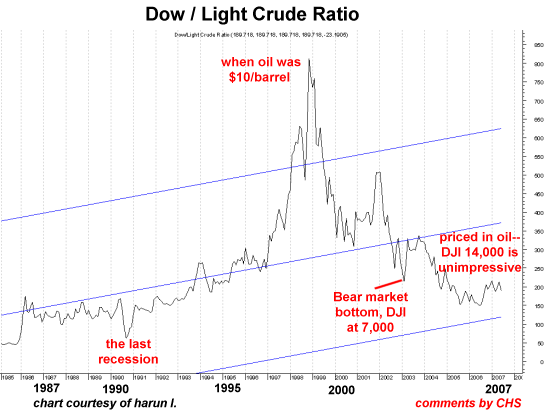
Thank you, Darrell C. ($40), for your very generous donation to this humble site. I am greatly honored by your contributions, financial and intellectual, and readership. All contributors are listed below in acknowledgement of my gratitude. This Week's Theme: This is your wake-up call, America Housing's Three Black Swans July 30, 2007 Conventional wisdom holds that real estate declines are slow, orderly trends which unfold over many years. But could the housing market be as primed for a "Black Swan Event" as the stock market? Let's look at a chart of the last housing decline, circa 1990-1996, courtesy of Lee Williams and the California Housing Forecast. The light-blue line traces the 17% decline in San Diego housing in that 7-year period, as reflected by the Case-Shiller Index. The dark blue line traces the current housing bust's decline. (Lee William's detailed article on Housing Affordability is posted on Schahrzad Berkland's excellent California Housing Forecast.) The red lines trace "improbably rapid" declines--i.e. Black Swan events. 
Lest you think that sudden changes are virtually impossible, please consider Lee's chart of Notices of Default and foreclosures: 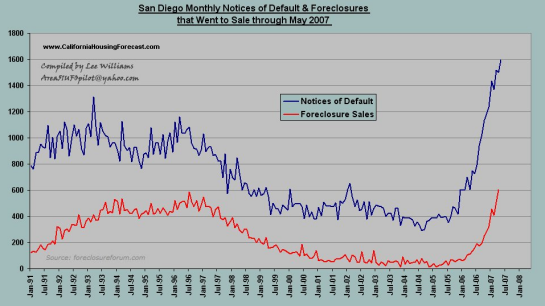
And lest you think this parabolic rise is only a San Diego phenomenon, please read this front-page feature in the 7/29/07 San Francisco Chronicle: LIVING THE AMERICAN NIGHTMARE: FORECLOSURES ON THE RISE: This year, almost 1 million people nationwide will enter a stage of foreclosure, according to RealtyTrac.com. That great tidal wave is ravaging the already beleaguered real estate market and causing repercussions from Wall Street to Washington, D.C.The popular book (recommended here by U. Doran) by Nassim Nicholas Taleb The Black Swan: The Impact of the Highly Improbable The factors triggering a landslide of NODs and foreclosures are gathering momentum with every passing day: 1. Fixed-rate mortgages have climbed to 6.70%. This is a far cry from the bottom rates of 5% of a few years ago. The jump from 5.2% to 6.7% may not look like much, but it's a jump of 29% --a staggering increase in the cash needed every month to service a mortgage. 2. Fewer borrowers qualify for the best rates. In the above S.F. Chronicle story, one self-employed borrower re-financed his initial loan. His new rate: 10.5%. Rather than track the "best rate" being advertised, perhaps we should be tracking the "real rate" desperate re-financers are accepting as credit tightens. 3. Real rates being offered to borrowers and those trying to re-finance are steep. The difference between 6.7% and 10.5% is 3.8% -- a staggering 56% premium over the headline rate. That translates into a payment which is $19,000 more per year on a $500,000 loan. ($52,500 - $33,500 = $19,000) 4. The focus on subprime borrowers glosses over the HELOC homeowners (home equity loans) who are underwater. As one of the cases in the above story illustrates, homeowners who extracted most of their home equity in the belief that the rise in their wealth was never-ending are discovering that the sag in house prices has dropped them underwater. As their home equity loans re-set, they find they can no longer afford their once-affordable home. 5. Prices are dropping much faster than statistics reflect. Another case described in the S.F. Chronicle piece describes a property which was appraised for $630,000 in January that now has a "real time" market value of about $455,000. 6. Buyers at the peak in 2004-5 have hung on as long as they can, and are now capitulating en masse. As crazy as it sounds to those of us from an earlier era, buyers with incomes of $2,600/month willingly accepted mortgages with payments of $2,600/month--not including taxes and insurance. By working weekends, borrowing, etc., many of these buyers have managed to make these back-breaking payments for a few years. But now the well has run dry, and they are falling off an unavoidable financial cliff. As my notes on the chart suggest, there is a generational element to these waves of default and foreclosure. Generation Y (those in their 20s) have no memory of the last downturn in the early 1990s, so they were quickly caught up in the get-rich-quick, housing-never-goes-down mania of the 2000-2005 period. Buying with no money down and accepting "liar loans" with equanimity, they are the first to bail out. Lacking any equity and with few prospects for jumps in wages gigantic enough to cover their rising payments, the decision to get out is painful but unavoidable. The next Black Swan Sighting will occur next year, when Gen-Xers start losing their jobs. Those in their 30s are cushioned from the sudden decline in values by virtue of their buying into the housing market earlier, in the late 90s and dot-com bust era (2000-2003). The fabulous increases of 2004-5 left buyers on the Left and Right Coasts with enough equity to ride out declines, and time to re-finance out of adjustable-rate loans into fixed-rate mortgages before credit tightened. But Gen-Xers are heavily dependent on high-paying jobs. Once one spouse loses a big-bucks job, the debt-bomb starts ticking. As the economy sink rapidly into a long-delayed, deep recession, job losses will decimate wage-earners' ability to keep up huge mortgage payments. Gen-Xers' parents are very much alive and kicking, and facing their own financial woes (see below), so unlike the older Baby Boomers, Gen-Xers can't hope to inherit a fortune or a free-and-clear house to save them. They will cling on as long as possible, hoping to find jobs which pay the same as the ones they lost, but when that search becomes futile, then they will be forced to liquidate/sell en masse. This will trigger another Black Swan decline in housing. The Baby Boomers have the equity, but as they lose their health insurance and suffer health issues, they too are being forced into bankruptcy. This unexpected process is already playing out nationally, as Boomers juggle helping their parents and offspring while their own health suffers the usual slings and arrows of advancing age. The Boomers are in a triple vise: they are as dependent on high-paying jobs as Gen-Xers, and even less likely to find replacement jobs as the recession lays waste to the U.S. economy. Many have spent freely of their equity (via home equity lines of credit -HELOCs) even as they counted on the ever-rising equity in their homes to fund their retirement. A single health crisis--or a health crisis in a parent--can be a tipping point which pushes the family into a financial slide which leads to foreclosure or bankruptcy. As retirement looms, even healthy Baby Boomers start realizing their retirement dreams are fading as housing drops. Just as in the stock market, you can watch profits vanish for only so long, and then you sell to retain what little is left. This panic selling by soon-to-retire Boomers will trigger the final Third Black Swan decline. The notion that 76 million Baby Boomers can all sell their primary residences to the following generation of 40 million at sky-high prices... do you see a wee disconnect here? If you examine U.S. demographics in the broadest terms, it becomes abundantly clear that housing will be in over-supply for decades to come. Yes, there will be immigration, but less as the recession dries up employment. And most immigrants are coming to work in low-paying jobs; they will not be buying a Manhattan condo or a Santa Monica bungalow or even a McMansion in Phoenix. As these demographic realities become visible, the rush to the exits will become a stampede, making the resulting drop far deeper and faster than anyone expected. Many Baby Boomers rushing to cash out already own a second or third home purchased in the bubble; they have no need to buy another home. So as their main residences flood the market, raising inventory ever higher--who's going to be buying these millions of houses and condos? For those who wish to explore generational and demographic issues further, I recommend The Fourth Turning Fewer: How the New Demography of Depopulation Will Shape Our Future and The Coming Generational Storm: What You Need to Know about America's Economic Future. And speaking of Black Swans, here is haiku from reader/contributor Allan J. Bears laugh, Bulls cry the Black Swan wings land rough sea jagged graph down lightning jag up wind blows old the dashes, the flashes the tears, the glimmers the nerves of fists my oil house cold our country closet bare war nags our children hearts darken, adrift eyes burn to see history quivers voice Thank you, Allan, for these thoughtful verses. I am also grateful to frequent contributor Bill Murath for his kind words on the Haiku which has graced these pages: It is so cool that in amongst all the economic and political essays you can throw in Haiku as a topic and then have numerous readers contribute some excellent pieces. I will not add much more since this is meant as a sincere high five, but I was just thinking that of all the blogs I read not one could pull this off.I must credit longtime correspondent UKC (our first UK correspondent way back when) for the brilliant suggestion of eliciting Haiku from this site's creative, erudite, witty readers. Thank you, UKC, and thank you, readers. Thank you, Renee S.J. ($10), for your fourth donation to this humble site. I am greatly honored by your ongoing, steadfast support and readership. All contributors are listed below in acknowledgement of my gratitude. If you found value here, then perhaps you will feel moved to Your readership is greatly appreciated with or without a donation. Construction Defects Haiku and Black Swan Sighting July 28, 2007 Longtime reader/correspondent Cindy Schnackel submitted a series of Haiku on a rarely-mentioned but increasingly ugly aspect of the housing bubble's bust: construction defects: Granite Countertops. Pretty place to spread out your legal documents. Water coming in. House rotting from inside out. No Window Flashing. Slums of tomorrow are disposable housing being built today. Left to get his tools Waiting six months for repairs. He never returned Builder says it is normal for concrete to crack. Hand fits inside crack. The word “cosmetic” Hides a multitude of sins When attached to “crack.” Thank you, Cindy. As for the ultimate end of abandoned/defective exurbia, I offer this: tumbleweed ghost town posh gated community now bulldozed rubble. On an unrelated topic: I have a gut feeling that the stock and credit markets are about to experience a "black Swan Event," i.e. a supposedly "impossible/improbable" decline of epic proportions. Frequent contributor U. Doran recommended The Black Swan: The Impact of the Highly Improbable This is fundamentally the thesis of a book I have often recommended here, The Misbehavior of Markets, Then there's a little thing called luck, which may finally be running out. The Powers That Be which have reaped such enormous financial and political gains from the past six years of essentially bogus (read borrowed) "prosperity" have had an unprecedented run of luck: no attacks on the homeland, a quiet hurricane season last year, an uninterrupted flow of cheap money via the yen carry trade, a willing Chinese central bank soaking up $1 trillion in U.S. debt with nary a whimper of protest as the dollar loses a third of its value--all extraordinary trends of amazing fortune. (pun intended) Could the PTB and the Plunge Protection Team's run of stunningly good luck be coming to a natural end? After all, nothing lasts forever. The possibility that the yen carry trade may suffer an abrupt unwinding is addressed by blogger Karl Denninger over at the Market Ticker blog (well worth reading), and by Gary Dorsch in DEJA VU, SPIKE RALLY IN JAPANESE YEN SPOOKS GLOBAL MARKETS (thanks to U. Doran for submitting this article). Could another Gulf hurricane be the catalyst for oil to jump from $77/barrel to $80/brl? Or might it rise to $80 - $100 just on global supply/demand imbalance alone? Whatever the cause, the PTB won't be able to spin a happy Euphorestra-induced story about it. Others have pointed to the rise in the VIX volatility index and many other technical indicators to suggest a reckoning is finally at hand; U. Doran sent over this excellent summary Bearish Divergences Abound by Frank Barbera. While common sense suggests a slow, rocky decline in the markets into seasonally troublesome October, my seventh sense (even more unreliable than my sixth sense) is quivering with a premonition that the markets aren't going to be "rational" and wait for October. That may well be a Black Swan circling higher and higher in a gyre, no longer heeding its frantic Masters' urgent commands. Thank you, Brett W. ($20), for your generous donation to this humble site. I am greatly honored by your gift and by your continuing readership. All contributors are listed below in acknowledgement of my gratitude. The End of Entitlements July 27, 2007 Readers sent in three more Haiku which capture the end of the stock market's global euphoria with uncanny artistry: Tim H. Summer vacation Fools and children do not heed The approaching storm Fastwater Dog days, summer's here. Markets wobble, credit fears. American dream. UKC "It's never different this time" the flying stone laughs skips and splashes without care the water will wait Frequent contributor and fellow blogger Fred Roper sent in this stunning example of mindless euphoria. Countrywide Financial (CFC) is the nation's largest mortgage outfit. The company has been hyped by moronic pundits for months. But if we examine what insiders are doing, we note insiders sold $700 million of their own stock and purchased a grand total of $73,000. As Fred noted: This is a buy signal, right? form 4 (insider buys and sells) for Countrywide Finance Total buy: $73,417, total sell: $693,954,180, net total: $-693,880,762 On to the main topic of the day: the End of Entitlements. I have recently been discussing long cycles, and the potential for a severe crisis in the U.S. around 2021. Based on three long cycles now in motion, I believe one outcome of the 2021 crisis will be the end of entitlements--both the payments, and the mindset of "I deserve this." Before you gag on your coffee/tea/water, take a look at this chart of the Federal government's own rosy predictions: 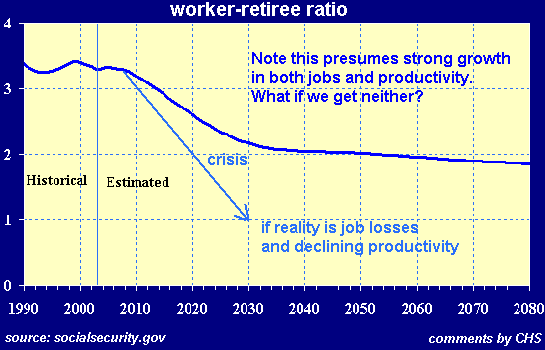
Recall that 76 million Baby Boomers, fully 25% of the U.S. population, begin drawing Social Security in 2008, and Medicare in 2011. According to this article, there will be 54 million retirees tapping Social Security and Medicare in 2020: The jolt of boomer retirement is headed our way. According to the Bureau of Labor Statistics, the civilian labor force is currently about 153 million. On the face of it, even with little job growth, we should still have 3 workers for every retiree in 2020. But the assumptions this is based on are faulty. 1. Medicare costs are skyrocketing, with no counter-trend in sight. As I have reported before, "Medicare program costs have risen from $70 billion in 1985 to $162 billion in 1994 to $390 billion in 2007 and are estimated to rise to $500 billion in 2011." U.S. Healthcare: Two Reports from the Front (February 1, 2007). At this rate of growth, Medicare will exceed all Pentagon/Defense spending in just a few short years, and will dominate all Federal spending by 2021. This growth is clearly unaffordable, unless we stop spending on virtually every other Federal program except interest on the National Debt. Please see my other recent entry on Medicare, Medicare Waste--50%? (January 24, 2007) 2. Global competition is a huge challenge to U.S. productivity and job growth. Globalization is still in its infancy as a trend, and the notion that the U.S. economy can add tens of millions of jobs and luxuriate in ever-rising productivity gains for decades to come is at best suspect. Much of the vaunted "job growth" since 2000 has been in money-churning, essentially unproductive fields such as real estate, mortgage generation and Wall Street financing. Most of the rest has been in construction (now fading fast as the nation wakes up to extreme overbuilding) and retail (filling up thousands of new retail outlets with clerks). To claim that these trends are sustainable is quite a stretch. 3. The 20+ year credit cycle has turned. Money will now become dearer for the next 17-20 years. Credit cycles tend to run about 17 to 23 years in length, and interest rates have slowly been rising since late 2003. That suggests rates will rise, perhaps slowly, perhaps quickly, for at least another 14 years--in other words, until the key year of crisis, 2021. The U.S. has sustained the insane growth of Medicare and Iraq/GWOT (global war on terror) by borrowing trillions of dollars from non-U.S. entities. As the credit cycle turns, this borrowing will rise in cost, becoming unaffordable as the rising interest costs squeezes all other spending. Consumers and businesses will also find new borrowing increasingly prohibitive, and as a result consumer and business spending will be curtailed--not for a month or two, but for 15 years. As Medicare costs rise at 10%+ per year, no amount of plausible job and/or productivity growth can keep pace. Employment and productivity have tended to rise at 2% a year, but there are no guarantees that this trend can hold for the next 15 -20 years. It is also possible that rising competition, borrowing costs and the decline of the money-churning economy will result in 2% annual losses in jobs and productivity. Predicting long-term trends is a tricky business. Most trends change course unexpectedly, and predictions based on the recent past turn out to be faulty. Can we really rely on the spectacular gains in wealth, productivity and employment from 1982-2006 to continue unabated for the next 15-20 years? I would suggest counter-trends are already in force which will lead to the opposite: a decline in wealth, productivity and employment which will lead to a fiscal crisis by 2021. We as a people will have to come to grips with the harsh reality that we cannot afford the entitlements which were promised. I would also suggest that a cultural change may occur in the value system of the nation, a change in which people throw off the overweening sense of entitlement which pervades our culture, and embrace (because they have no other choice) self-reliance and self-responsibility. Here are two additional links on Social Security's future: Social Security at 70. Productivity growth and Social Security's future. Thank you, Robert S. ($50), for your generous support of this humble site. I am greatly honored by your donation and by your readership. All contributors are listed below in acknowledgement of my gratitude. Euphorestra Side Effect Alert July 26, 2007  Pharmaceutical Safety alert! This site has just learned that Astra-Zastra's new drug,
Euphorestra, has a terrible though long-delayed side-effect: after one year of completely
blocking reality, the drug rapidly loses effectiveness, dropping the hitherto complacent,
sunny customers into a sharply disconcerting world they have lost the ability to cope with:
Reality.
Pharmaceutical Safety alert! This site has just learned that Astra-Zastra's new drug,
Euphorestra, has a terrible though long-delayed side-effect: after one year of completely
blocking reality, the drug rapidly loses effectiveness, dropping the hitherto complacent,
sunny customers into a sharply disconcerting world they have lost the ability to cope with:
Reality.
Even more disturbing: the drug was widely used by our stock market and political elites, who are now finding Euphorestra no longer blocks out a shockingly dismal reality. We've all noticed an incredible disconnect from reality over the past year: the unceasing ascent of highly risky speculative markets, the descent of the dollar and the astonishing insistence by our elected Administration that there is light at the end of the tunnel in Iraq. (Isn't that what people report as they near death's threshold? A brightening light? The list of insane denials of reality goes on for pages: that the subprime loan meltdown is contained, that derivatives such as CDOs lower risk for investors, etc. etc. etc. But let's take a look at the official Astra-Zastra Euphorestra ad: 
Looking ahead to the near future, as the U.S. economy spirals into a recession the likes of which few of us have seen, I would suggest the following ad to the marketing mavens at Astra-Zastra: 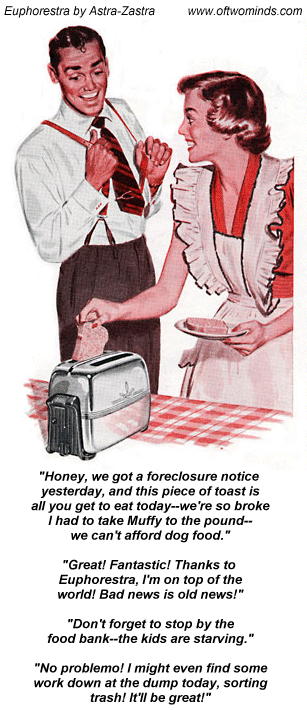
At least the puzzling euphoria of our financial markets and tone-deaf politicos can now be explained--and there is some small comfort in knowing the bullet-proof denial of reality has a pharmaceutical cause. After all, many were beginning to question the sanity of those claiming absolute absurdities, such as "this administration supports a strong dollar." Maybe that's why it's dropped 33% in value since late 2002? If this is "supporting a strong dollar," I'd hate to see what a weak-dollar policy looks like. But it is troubling that Astra-Zastra found such willing volunteers for this powerful medication amongst the ranks of our financial and political elites. Judging by the role call of those wolfing down Euphorestra by the handful (sorry, the list is restricted due to privacy concerns), it would seem our leaders actively sought some fantasy or drug-induced relief from the realities they spawned and nurtured for the past seven years. The withdrawal is apparently as vicious as the one visited on working-class addicts of crystal meth (ice), another euphoria-inducing drug with a horrible letdown. Reports of breakdowns and sobbing fits in the most elite corridors of power are becoming alarmingly common. It seems many of those in the top ranks of our elites--including those guiding our government and those in the shadow government of hedge funds, military contractors and the like--actually believed the poppycock their handlers fed them (along with heavy doses of Euphorestra) about the outstandingly wonderful unassailable strengths of the U.S. economy and its place in the world. As if all this wasn't disturbing enough, it now appears that the leaderships of other nations from Denmark to China have also been soothing their angst with black-market Euphorestra. This suggests that when the wheels have undeniably fallen off the rickety U.S. economy, the world will be ill-prepared to deal with the resulting reality. It is cold comfort to finally grasp why the Chinese leadership has continued buying stupendous quantities of depreciating dollar-denominated bonds--they're in a Euphorestra-induced happy-happy daze. Skeptical of Euphorestra's early effectiveness? Take at look at the chart of Amazon.com, once and again an Internet stock darling with outrageously high price-earnings ratios: 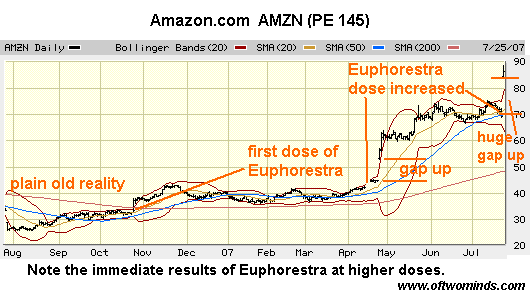
This is a chart of euphoria rising to dizzying nosebleed heights--heights which guarantee a painful plummet back to reality (say, a PE of 20). Thank you, Dwight M. ($50), for your astonishingly generous support of this humble site. I am greatly honored by your donation and by your readership. All contributors are listed below in acknowledgement of my gratitude. Bite-Sized Poetry July 25, 2007 Poetic gods rejoice--readers sent in more wonderful Haiku for our reading pleasure. For those left cold by Haiku, we return to our regularly scheduled unpredictable gumbo tomorrow. What I like about Haiku is the challenge of squeezing complex emotions and thoughts into bite-sized poetry. You can read Haiku in just a few seconds, but the imagery and meanings reverberate long after. Of the masters, I like Ryokan best, but who cannot like Basho? Here are readers' contributions, in order received: Kenneth M. Biblical Summer (8 linked Haiku) Bumblebees sniff/hop spoons of vanilla ice cream fly away, dripping... Epic winds don't blow news down avenues. A pen detonates cities. Impeachment speeches echo off limestone. Dollars lose the glam of green. Kites above my bed are tied to shotgun triggers. There is no excuse. Desert dust is wiped from goggles. Red blood from a vision cakes and dries. Divining rods can't find water or oil. Distant shores smell of coffee. No sky for the cat to lose its cry in. Hymns are hummed in beggars' cups. Tonight, the world could end. We've come a long way since round stones and slingshots. Greg silver and gold coins capitalist ships burning plundering begins Doe Lo the reeling mind aches waits for beginning of end mad snake bites his tail weary head in hand cries out for much needed rest knowing end is far hope is running thin thinner water runs clearer clear to the ending Renee S-J. Just came across something interesting at work today. Management put out a bar graph showing our annual freight tonnage, inbound and outbound from 2002 thru 2006. Peak was the year 2004, a combined tonnage of almost 300,000 dollars. 2007? So far about 65k. Ouch! i work at a factory which has been operating since 1896. We do vinyl, plastics, etc for automtive interior trim, construction, pool liners and the plastic sheets used in Dentist X-ray packets. (The little ones that go in your mouth) among other items. In honor of such a drastic slippage in tonnage, here is my haiku: Tonnage is fading I see my lay-off coming thank the gods I saved. Renee's 17 syllables contain great wisdom and a sobering view of our collective future. Thank you, readers for a delightful array of creative Haiku. Here is my weak attempt for the day: Dow fourteen-thousand drunken Bulls borrow, heedless of the cliff ahead Thank you, William B. ($25), for your unexpectedly generous support of this humble site. I am greatly honored by your donation and by your readership. All contributors are listed below in acknowledgement of my gratitude. Reader Haiku July 24, 2007 My wishes came true and readers responded with some wonderful haiku: (in order received) Mike S. I am out of touch Celeb gossip is now news How long will we sleep? Don E. unwinding we come spinning leaves from trees to drop swallows returning Sherry P. Extinguish Bear Stearns the summer heat now portends lasting winter burns And by way of humble gratitude, I offer this: Out of nothingness readers create new beauty Haiku gods smile Thank you, Bob K. ($20), for your kind and generous support of this humble site. I am greatly honored by your donation and by your readership. All contributors are listed below in acknowledgement of my gratitude. NOTE: I will be away from my desk through Tuesday so email response time will be delayed --thank you for your patience! I am reading all email at night but unable to respond until Wednesday. A Haiku Kind of Week July 23, 2007 Longtime correspondent UKC suggested I revive the Haiku invitation which appeared here before, a request I am happy to follow. The idea is to submit a haiku (three lines of 5, 7 and 5 syllables, preferably one relating to a season or the weather) on the themes of the past two weeks: the Great Unraveling and Am I Insane? Here is my pathetic offering to kick things off: Ah, insanity euphoria reigns supreme lightning strikes, trees burn NOTE: I will be away from my desk through Tuesday so email response time will be delayed, and entries may be sporadic. Thank you for your patience! I will post Haiku submittals as soon as my schedule permits. Oil, Dirt and Our Food Supply July 20, 2007 Longtime contributor Chuck D. recently sent in a thoughtful analysis on the interplay between food supply, development, soil and oil: I don't know how far out you have planned this week's theme, but you might want to consider doing a segment on the insanity of our food supply system. For example, how insane is it that we:Thank you, Chuck D., for these insightful comments. Another reader earlier this year described the same issue, that soil is a resource which cannot be scraped away, covered in compressed gravel and concrete, then exposed to air and expected to grow anything useful. Like air and water, soil is a resource which a market economy cannot value correctly. I have covered this before and recommended The Tragedy of the Commons, the seminal paper by Garrett Hardin which described the failure of the market to value/price common essential assets, i.e. "the commons." 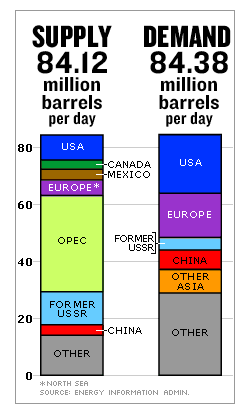
The coming shortage of oil--i.e. the gap between the limited supply and insatiable global demand--is addressed by two Wall Street Journal articles, one in April and another in July, which was sent in by frequent contributor Michael Goodfellow. (Note that an online subscription is required to read the WSJ archives, but you can read the 7/16/07 story in a library.) IEA Warns That Low OPEC Output Is Likely to Drain Global Oil Stocks (4/12/07) The International Energy Agency warned Thursday that output by the Organization of Petroleum Exporting Countries had hit its lowest level in over two years on production outages and self-imposed cuts, a factor likely to drain global oil stocks in the coming months.Potential Energy Crunch May Bring Other Fuels to Fore (7/16/07) "It is a hard truth that the global supply of oil and natural gas from the conventional sources relied upon historically is unlikely to meet projected 50% to 60% growth in demand over the next 25 years," says the draft report, titled "Facing the Hard Truths About Energy."My own study of the subject (admittedly an amateur's research) suggests petroleum output is maxed out at 85 million barrels a day. New supply only replaces what is being lost in declining supergiant fields. The idea that the earth can produce 120 million barrels a day of petroleum is pure fantasy, on the level of hoping the Martians arrive bringing a techno-miracle to save the day. The only solution is to use the planet's remaining petroleum much more wisely and efficiently than we do now. Michael also recently sent in this piece on a technology which would use much less oil--an example of many alternative technologies which are under development that could radically cut petroleum demand: Radical Engine Redesign Would Reduce Pollution, Oil Consumption For a darker view of the slide down the slippery slope of Peak Oil, I highly recommend glancing at Life After the Oil Crash. You may find it far-fetched, as it refuses to concede technological fixes will actually enable the current global industrial and transportation complex to continue on more or less "as is." This is definitely worth reading, just to spark your own thinking on the long-term consequences of Peak Oil. Thank you, Reed H. ($20, second donation), for your continuing support of this humble site. I am greatly honored by your generous donation and by your readership. All contributors are listed below in acknowledgement of my gratitude. If you feel inspired to rebel against the MSM's bushels of legerdemain and the sad sick faith of endless pervasive marketing and advertising which pollutes every media, including the blogosphere, then perhaps you will feel moved to Your readership is greatly appreciated with or without a donation. NOTE: I will be away from my desk through Tuesday so email response time will be delayed, and entries may be sporadic. Thank you for your patience! Insanity and Complacency July 19, 2007 Maybe you've had this experience, too. You start talking about the coming Great Unraveling / Depression and your friend/relative looks at you with an odd expression, e.g. "this guy is nuts." Since I have friends all over the country, as do many of you, no doubt, I know this isn't a California phenomenon. Regardless of where they live--Virginia, Massachutsetts, Florida, you name it--real estate is fine, sales are positive and prices are stable or still rising. Ditto the economy. Everyone I know (other than you, dear readers, who I have met via the Internet) is absolutely complacent about their personal lives, the nation and the planet. Sure, there are problems, but there are always problems; so what's different? What's different is the supreme complacency at the Wintry end of a long cycle of history. I have written about various cycles recently, and knowledgeable reader Matt S. was kind enough to recommend a book on just such a long cycle: The Fourth Turning Before we get to the book, let's consider an example of the insanity/complacency disconnect which was submitted by frequent contributor U. Doran: BOSTON'S CRUMBLING ECONOMY. The writer of the piece just walked around his central Boston neighborhood, snapping photos of all the retail and commercial spaces for rent. There are 30 such photos. I have commented in the past on the hollowing out of our local downtown--not just local businesses, but chains: Eddie Bauer closed a few years ago, and now a huge Barnes & Noble bookstore has closed. How can the stock market be hitting new "highs" (see yesterday's entry) while bricks and mortar America is filling with empty storefronts "in these prosperous times"? I know the standard answer is the stock market is weighted to companies like IBM and Coca-Cola which reap most of their sales and profits overseas. In other words: the U.S. can be a garbage heap of consumer debt and local financial ruin, and the market will be lovin' it because the Global 500 don't need the U.S. consumer to make scads of money. Perhaps. But since the U.S. is still 30% of global GDP, and virtually every overseas "powerhouse" (Germany, Japan, China, etc.) is an export-based economy (i.e. depending on selling to someone overseas rather than to their own citizens), all of those overseas companies and workers still depend on the U.S. consumer for their pricing power and profits. So the dragon eats its own tail. IBM is making big bucks selling to non-U.S. corporations who are prospering from selling to the U.S. consumer and to the E.U. and Asian exporters, because the E.U. and Asian exporters are ultimately prospering by selling to the U.S. consumer. Any way you slice it, it all comes back to the 70% of the U.S. economy (20% of the entire global GDP) which is U.S. consumer spending. I won't go into a long economic explanation here, but please note that if you lose 10% of your sales, and your competitors lose 10% of their sales, then you've all lost pricing power which means you've lost profitability. The global supply chain has been pared to the bone, so forget "cutting production and transportaion costs." Those are both on the rise globally. This is why the global economy will roll over when the U.S. consumer rolls over: the domino effect of non-U.S. workers, governments and exporters ultimately depending on sales to the U.S. for their profits and pricing power. As for the argument that China is rapidly morphing into a consumer economy which doesn't need overseas markets--there is no evidence to support this fantasy, as I outline in Can the U.S. Go Down and China Stay Up? (June 5, 2007). So the argument that the U.S. consumer and retailer can dry up and blow away without affecting the global economy or U.S. corporate profits (rising double-digits for 5 years running, with no end in sight!) is simply unsupported by data. Here's what Matt had to say about The Fourth Turning: As for the 4T, the basis for the theory is pretty simple - as the oldest people in a society die off, most of the wisdom and experience they have goes with them - thus people tend to make the same decisions and mistakeds over and over again (history rhymes idea). And the cycle length is generally around 80 years, what the authors call a saeculum, the length of a long human life. Each of the 80 year cycles get split up into 20 year generations, so we have the GI's (now leaving life ), the Silents - born from around 1925 to 1945, the Boomers, the Gen Xers, the Millenials (another round of GI's) and now the Homelanders (another round of Silents).Thank you, Matt, for the recommendation and commentary. The book's authors make a strong case for an 80-100 year cycle of human history which ends in a transformative crisis. In American history, the cycle's eras are: I have described the Kondratieff cycle, which suggests a financial/economic bottom around 2012-2014, and The Rhythm of War which suggests an alignment of cycles in the decade 2020-2030. I have also noted how post-bubble stock markets tend to have a "echo bubble peak" seven years after the initial bubble bursts (1929 - 1937, 1966 - 1973); after this echo bubble bursts, a long period of malaise/decline kicks in. (see charts below) I agree with Matt that peak Oil and the global jockeying for declining resources (oil, water, food) could easily set the stage for a global conflagration around 2021. I would add the potential for war between China and Taiwan and between Pakistan and India as possible flashpoints. I recommend checking out The Fourth Turning (at your library, if they own a copy) for a thought-provoking and sobering "long view" of American history and the coming two decades. 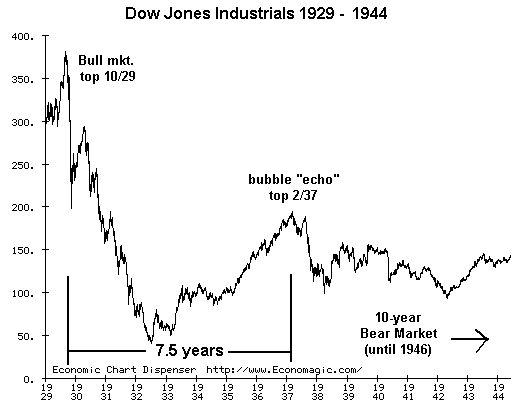
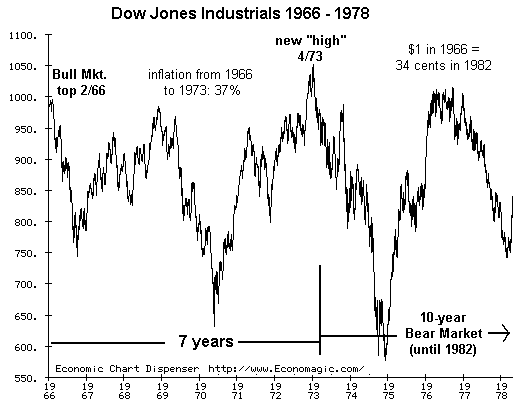
Though the mainstream financial press and cheerleaders don't mention it, note that the stock market bubble blew up in March 2000. Add 7.5 years and you get September 2007 as the bubble-echo meltdown target. But never mind history; this time it's different, and we're in a 20-year cycle of prosperity and permanent low interest rates. Oh, and housing has bottomed, and there's never a better time to buy anything/everything than now. Since I haven't run this pitch for two weeks, perhaps seeing it again will inspire you to Your readership is greatly appreciated with or without a donation. Thank you, Terence P. ($25), for your contributions (financial and intellectual) to this humble site. I am greatly honored by your support and your readership. All contributors are listed below in acknowledgement of my gratitude. The Price of Fear July 18, 2007 Clarification/Correction: Perceptive reader Keimpe B. offered the following clarification/correction to yesterday's entry on retail space per capita: The graph of 'Square feet retail space per person' you're displaying in your blog is misleading. The numbers refer to Shopping Center Retail Space per person, not Total Retail Space per person. If anything it shows that Europe is more cozy, featuring many smaller stores.Thank you, Keimpe, for drawing a distinction between shopping center space and retail space that was lost on me. In my defense, I can only say that if you drove through Fresno it seems entirely plausible that the U.S. does indeed have 7-10 times the retail space of our Western confreres. On to the critically important topics of the day, which were suggested by astute reader Bob K: (emphasis added) I saw yet another headline today about the new DJIA record high. I may not be phrasing this adequately, but I hope you get my drift...I am fortunate enough to have some 401K and IRA investments but these new record highs do nothing for my daily cash flow, i.e. the cost of gasoline, milk and orange juice alone are negatively impacting my budget but this new record today helps not at all. So why should I care about the new index records? And how many people are really positively impacted 'now' by the new record, i.e. who sees any benefit today in their checkbook?Excellent observations and questions, Bob. To start, let's put the Dow's "new high" in perspective. Frequent contributor Harun I. submitted a chart of the correlation between the Dow Jones Industrial Average (DJI-30) and oil (light crude). The high spike at the market's 2000 top means that a share of the DJI bought a great amount of oil. The low mark in 1985 meant that a share of the DJI bought very little oil. As you can see, the current "new high in the DJI" buys far less of the most essential industrial commodity than it did in 2000. By this measure--in terms of a tangible non-discretionary commodity, oil--the Dow's "new high" is singularly unimpressive. 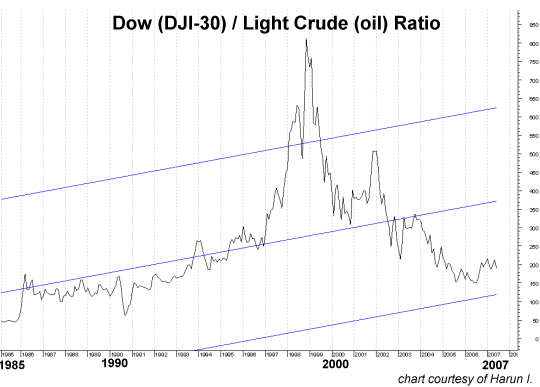
As for manipulation: knowledgeable reader David M. contributed an insider's understanding of the incredibly shaky foundations of the CDO market. (emphasis added) I used to be a programmer for one of the mega-investment banks - its a household name, top 3 or 4. I did some work for the business unit controllers (similar to accountants) for the CDS (credit default swaps) at the company. This was 3 or 4 years ago and the business in CDS trading was growing like crazy.In other words: the guys selling the CDS to unwary clients are telling the guys who are supposedly establishing the value (mark to market) "objectively" what the derivative is worth. Talk about the fox guarding the chicken coop. If this isn't an informal conspiracy to defraud the unwary investors buying highly risky securities, then what is? So when the MSFM (mainstream financial media) trumpets the "free market" and derides "conspiracy theories", feel free to gag, shred the paper or throw something at the TV. The MSFM is in fact part of the conspiracy, for their glib assurances are part and parcel of maintaining the illusions and lies at the very foundation of the CDS/CDO markets. As to why would anyone join in such a deception--look no further than the record profits being booked by Morgan Stanley, Merrill Lynch et. al. The fees being generated by cooking up and selling CDOs and other derivatives are immense, in the tens of billions of dollars annually. That's a powerful incentive to keep the game fixed and running. It's 3-card monte on a trillion-dollar scale. Correspondent/blogger Fred Roper sent over a comment by Winston Munn on the Big Picture blog which suggests the "marks" (unwary investors) are getting wise to the scam: Underwriters are affected already, having to pony up for some of the riskier corporate bonds no one is willing to buy.When the marks (institutional investors) stop buying, the merry-go-round abruptly stops. Harun also sent in a chart of the dollar/oil ratio, which reveals that in terms of purchasing power, oil is far more expensive than it was at the (inflation-adjusted) nominal high in 1990. 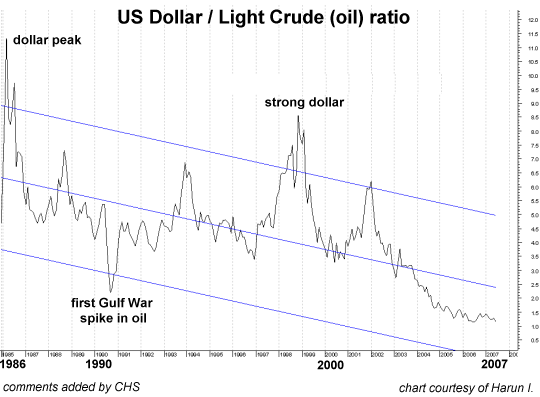
Harun's commentary suggests another reason for the large-scale manipulation which is pushing the stock market to nominal highs, even as the purchasing power of our currency (the dollar) is plummeting to new lows: the great, abiding fear of our current political leadership and their financial cronies that the 3-card monte fraud will blow up before they leave office. (emphasis added) In 1998 it was thought that LTCM would bring the world financial system down due to a liquidity crisis. But we have forgotten the lessons. LTCM thought it was well diversified against the risk to which it was exposed, and in a normal market they were essentially correct.Well said, Harun. Thank you, Keimpe, Bob, David, Fred and Harun for enlightening us all. Thank you, Vineet G. ($10), for your kind and generous donation to this humble site. I am greatly honored by your support and your readership. All contributors are listed below in acknowledgement of my gratitude. If you found some value here, perhaps you'd like to Your readership is greatly appreciated with or without a donation. A Walled-In Bunch of Houses Is Not a Community July 17, 2007 Correspondent J.B. submitted this interesting chart comparing "per capita" retail space in the U.S. with European countries: 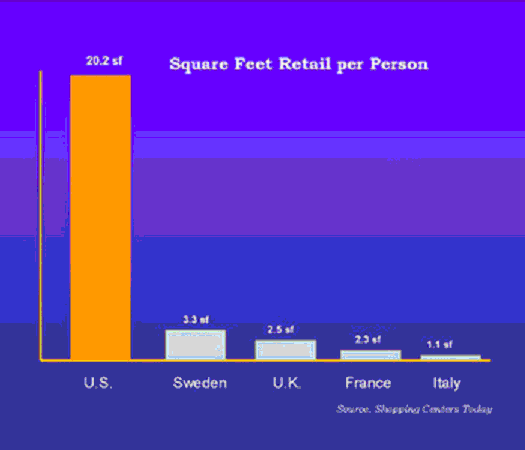
What's striking about this imbalance is that European cities have plenty of retail. If you wander around a city like Paris, you'll find ground floor shops are the norm along major streets. Even small residential streets near thoroughfares support neighborhood shops. Walking down a side street in the 16th Arrondissement (near the Exelmans Metro station), you find a small grocer, a bakery, a cafe, a tabac and a larger grocery store. Just a block away, the Avenue de Versailles is lined with restaurants and small retail; an open-air "farmers market" operates every morning on a small plaza. There is no shortage of retail space in European cities, nor shopping opportunities, and so you have to wonder if the U.S. really needs 7 times more retail space than Europe. As for over-building, correspondent S.S. submitted this apt observation: Funny you should mention "mall after mall" on your trip. My 14 year old son even noticed all the empty strip malls going up in the SW Chicago suburbs. He calls them "space available malls."And lest you think this insanity is only a U.S. phenomenon, correspondent Mega filed this report from the U.K.: Not just America for MEGA shopping mail projects, here in Liverpool building is busy! WE are rebuilding the city centre to make one of the biggest shopping centres in Britain.... Just as everyone is switching to shopping on line/overseas!I would also like to offer a first-hand account of living in a "gated community." Despite the desperate pleas of her three surviving children, my Mom bought a brand-new house in a gated community near Phoenix, AZ about a decade ago when this "self-selected imprisonment" trend really started to take off. (Your kids--what do they know? Nothing!) Although her decision mystifies us to this day, I think she "bought into" the propaganda that this was a "safe place" that locked the big bad world outside; I also reckon she was seduced by the amazing square footage being offered (a mere three bedrooms in those misbegotten days; now you get four or five, which is astoundingly better.) On our first visit to this middle-class American Heaven--at least that is how it was presented-- my Mom's first action was to notify Security about our car. The problem: it was parked in the driveway. This is unsightly, and therefore verboten. (There were no exclusions offered to Jaguars or other luxury vehicles, so it was very evenly enforced.) However, residents with visitors were allowed a few days grace. Next: ah, it's evening, let's take a walk. Hmm, there are no sidewalks. The vast stretches of pavement are for vehicles only. So we walk in the street, spotting a very few other residents walking their dogs or getting a bit of exercise. After passing block after block of carefully manicured front yards with no evidence of human habitation or individual character--you were proscribed from doing much more than posting a name placard or hanging a wind chime--we reach the Community Center. This was a truly Orwellian touch, for there was almost no one there but paid staff. Now it is true that many units in this subdivision were owned by Sunbirds, folks from Northern climes who only live there in summer, but the sales reps had carefully noted that the place was sold out and mostly occupied by fulltime residents. What greeted us inside the "Community Center" was a vision of the lonely corner of Hell. Though Sartre was undoubtedly correct in observing "Hell is other people," (from the play No Exit), this description only covers the ghetto districts of Hell, where miscreants are either shouting angrily or breaking into your house, crazy people are mumbling and cursing at all hours, pathological criminals are wandering around at night stabbing people--in other words, my urban neighborhood here in sunny carefree California. But there is another corner of Hell, the Lonely Quarter. Here, a large, lifeless room with a bar and overstuffed chairs is devoid of life. True, the television is on, blaring the current mind-numbingly idiotic offering of a 24-hour sports channel, and a tired potted palm clings to life in its glazed pot, but the only occupant of the cavernous space is a lone elderly man, sitting alone at a table. He may be watching the TV, or staring off into space; it's hard to tell. But my spirit sank into the deepest gloom at the scene, for this was the exact opposite of Community. Yes, there was the requisite bulletin board neatly announcing various classes and outings which had been scheduled by a paid staffer: a painting class, an exercise class, etc. But did any unsalaried resident care whether you lived or died? No one would even know you were dead or alive. You never saw your neighbors, much less got to know them, as there was no human activity in the "community" other than these artificial "community events" at the "commuity center." The "community" had all the charm of a low-security prison, which is basically what it was. My Mom sold out for a loss a few years later--of course the developer was busy building Units 5 and 6 across the 8-lane highway, so supply always exceeded demand--and moved to Sante Fe. Consider by way of contrast a company town. We happened to pass a company town on our camping trip, one established by a large electric utility decades ago for the employees of its hydo-electric plant. A company town must be livable, lest your employees flee. This town had a single street of well-tended houses, and a school and a general store. It was a small town, no more than a few hundred residents, roughly equivalent to a gated subdivision, but the feeling was the polar opposite of a lifeless gated Hell: people were out washing their truck, or tending their yard; it was a lived-in place, not a place tended by paid staff and inhabited by unseen owners. Developers don't build communities--they build secure blocks of dwellings. There is a difference between the two, conceptually and in the lived-in experience. I hate to disillusion those of you who have bought in a gated community, but they are not communities, and therefore they are fundamentally sad, artificial places. I lived in a company town as a teenager: Lanai City, island of Lanai, State of Hawaii. The company: Dole Pineapple. It was and remains a very livable community with an actual center. You know who your neighbors are because you see them on a daily basis, and know what kind of vehicle they drive, and you see them at the high School basketball game (go Pine Lads!) or in the store or post office. (There's no mail delivery, so you will go to the post office.) You will notice if someone is ill or out of town, and you will ask or be told without special effort. You won't necessarily like your neighbors, but you'll be friendly, and you'll pitch in for the reason that they are neighbors. We in America have busily constructed countless lonely corners of Hell, and told ourselves it is Heaven. But being told a lie, and believing a lie, is not the same as living a lie. Thank you, Don E. ($10, 3rd donation), for your very generous ongoing support this humble site. I am greatly honored by your contributions, both monentary and intellectual, and by your readership. All contributors are listed below in acknowledgement of my gratitude. Am I Crazy, or Is America Crazy? July 16, 2007 I went camping this weekend, and on the way through California's Central Valley (our destination being a remote section of the Sierra Nevada) I passed shopping center after shopping center in the last stages of construction. I managed to snap a photo of one outlet I thought summed up the "healthy consumer demand" and "strong retail sector" I keep reading about: 
Traveling north of Fresno, we passed block after block after block of new/under construction retail--the new "premiere" shopping destination for Fresno called River Park. Fresno is a major population center, with about 440,000 residents in the city and surrounding suburbs. Also note that its per capita income is $15,010, rather solidly in the lower-middle of California cities. The average per capita income in California is $22,000. Fresno has a long and proud history, and I am not suggesting it doesn't deserve a square mile or two of premiere retail heaven. What I am questioning is whether any moderate-sized metropolitan area of about 400,000 moderate-income residents can support the largest concentration of retail outlets in the known world. Yes, I am not kidding. River Park stretches on for city block after block, with more being built across the street and around the corner. Stores of particular note: Bar-Be-Que World and Vitamin Superstore. Both were huge. Need another $1,000 6-foot long BBQ grill? Of course you could buy one at Costo, Wal-Mart, Home Depot or a million other places, but don't you want to shop at a superstore that's ALL BBQ? Ditto for vitamins. Sure, you can buy them discounted over the Internet, but why not drive across town for the on-hand selection which duplicates the aisles of Walgreens, Longs, Rite-Aid and thousands of other outlets? I think you get my drift. There is no way that Fresno can support this concentration of retail outlets. And this is just north of Fresno; of course new retail is going up south, west and east of Fresno, too. On the way into the suburbs, we passed one vast gated community after another with names like "Opus One" in fancy script by the heavy security gate. Opus One? Excuse me, Maestro, where do you live? "Why, M'sieur, of course I reside in Opus One, in a quaint, charming little six-bedroom McMansion." Lest you think I am exaggerating, real estate development billboard after billboard pronounced "up to six bedrooms." Now you may have a real passel of kids, say, five or six, or have your folks and an aunt living with you, and need six bedrooms; but I suspect the demographic of buyers does not include many 7-person families. Apparently American home builders and developers haven't heard that the boom is over because large pieces of California's enormous Central Valley are nothing more than one vast sprawling construction site. Take the pleasant little town of Patterson. You pass it on I-5, deep in farm country, far from any urban source of employment. America's big national home builders are going nuts in Patterson, throwing up hundreds upon hundreds of new houses. This is a town of 20,000 people, folks, a small rural farm-based-economy town with a charming Main Street and few major employers. Can such a town absorb hundreds of new homes per year? It seems unlikely, to say the least. Retirees? No slam on Patterson, but it's not near recreation, or major hospitals or the other things retirees presumably seek access to. Commuters? No way. It's several hours to any major concentration of jobs. As I drove through this bizarre alternative-world of frenzied construction and the paving over of some of the best soil on the planet for soul-less, strikingly ugly McMansions and stucco boxes crammed cheek-by-jowl (so that 4-foot sideyard of dead weeds renders each a "single family dwelling") I had to wonder if I was insane, and I've missed the reality, which is the lending/building boom is in fact sustainable for decades to come, or if America is insane--insane to pave over beautiful, irreplacable farmland with crappy, poorly designed and built boxes doomed to be ghost towns in a few years, insane to build and sell these lifeless faux-communities far from any nourishment and insane to buy such impossible-to-cool-except-with-gargantuan-expenditures-of-fossil-fuels houses in the middle of what is essentially a desert fed by the largest artificial river system in the world. I'll continue looking at "Who's Insane?" as the week progresses. Thank you, Javier A. ($25), for your very generous and totally unexpected donation to this humble site. I am greatly honored by your support and your readership. All contributors are listed below in acknowledgement of my gratitude. Happy Bastille Day July 14, 2007 In honor of Bastille Day, I offer you a succinct comment from longtime correspondent Jed. H: When this Credit Bubble / SubSlime Loan, NOD/NOT REstate Crash "Fully Unwinds" ... it's going to feel like the French Revolution!!Let's hope there's no guillotine set up in the square, though I wouldn't mind seeing hedge funds, no-document, no-down mortgages and mortgage-backed derivatives banned.... Every once in a while I am honored to receive an email like this one from reader Glenda G.: I want to tell you that your writing is wonderful. I just happened upon I-State Lines, and have been held captive throughout. I read with all my senses. I smelled the Atlantic in North Carolina, and felt the breeze as Daz and Alex enjoyed it. I could hear the slots in Vegas and the quiet of the canyon. I could even smell the desert air. Anyway I just wanted to let you know that I really enjoyed your book.Wow! Thank you, Glenda, you just made my day/week/month. (And no, I did not bribe Glenda to say nice things about the book. Reading is a highly personal activity, and one person's delight is another's torture.) Speaking of I-State Lines, I want to extend a special thank you to Dwight M. and Robert S., both of whom responded with extreme generosity of money and spirit to my offer of a signed copy of I-State Lines to any reader who donates $50 (either at one time or cumulatively). Both Dwight and Robert contributed $50, for which I am deeply grateful, and each will receive a "collector's" signed copy of my little novel. This Week's Theme: The Great Unraveling 1893, 1929, 1973, 2007: Echoes of Rolling Thunder July 13, 2007 Let's start a re-cap of the week's theme--the Great Unraveling--with a brief look at The Panic of 1893: The Panic was the worst economic crisis to hit the nation in its history to that point. The National Cordage Company (the most actively traded stock at the time) went into receivership as a result of its bankers calling their loans in response to rumors regarding the NCC's financial distress.Hmm, calling in loans, 1893, calling in busted CDOs, 2007... and did you notice the 40-year cycle of recession/depression? 1890, 1930, 1970, 2010. Let's look at the similarities between then and now: 1. 1893: Massive debt-fueled speculation. Railroads and other speculative ventures (yes, they overbuilt railroads in the late 1800s, just like they overbuilt the Internet in 2000) were all financed with debt-- heavily leveraged debt. No money down, no assets, just paper and promises. Sound familiar? 2. 1929: Massively leveraged speculation. In the Roaring 20s, you could buy $1,000 worth of stock with only $100--a 10% margin requirement. Now, CDOs and other derivatives are leveraged 10 times or even 20 times. A drop of only 5% in the underlying security/mortgage/bond thus spells ruin for the 20X leveraged derivative. 3. 1970: Rising energy costs, deficits and inflation, war, stagflation. The "guns and butter" policies of the late 60s and 70s (paying for a horrendously expensive foreign war and a global Cold War, while lavishing massive Federal entitlements on millions of citizens) created unprecedented deficits and inflation which despite various manipulations (the Feds started the bogus practice of "core inflation") began to run away from policy makers and consumers alike until interest rates were ratcheted up to 16% in 1981. The oil shocks of 1973 and 1980 sent energy costs to multiples of previous costs--just as oil has risen from $10/barrel in 1998 to $74/barrel today. This combination of inflation, spiraling energy costs and business cycle slowdown created a decade of malaise and stagflation. 4. 1970s: Nowhere to hide for investors. The 1970s were a decade of decline for both stocks and bonds, especially when adjusted for inflation. Real estate faired better, as did gold, as "tangibles" were viewed as hedges against a sinking dollar. However, with the World's Greatest real estate bubble now deflating, real estate is not the "undiscovered hedge" it was in the 70s. Now let's look at what's different: 1. Peak oil. The supergiant fields which supply most of our oil are in permanent decline. The "deep ecologists" and oil geologists who forsaw the Peak of U.S. production (Hubbert's Peak) in 1969 were roundly mocked as the last of the planet's large fields were discovered in the late 60s: The North Sea, Alaska, Nigeria and West Africa. Since then, no supergiant fields have been discovered, despite billions spent in exploration. I had to chuckle (wryly) a year or so ago when the stock market leaped on the news that a 100-million barrel field had been discovered in the Gulf of Mexico. Nice, but that's only five days' worth of this nation's oil useage. At 21 million barrels a day, even a billion-barrel field is only 16 months of oil. And it takes a decade to drill and pump the field. Now as the North Sea, Saudi Arabia and Mexico decline despite all technological fixes, we're facing a global Hubbert's Peak. Resource analyst and correspondent U. Doran has kept us well-informed on this development; please glance at the links in these previous entries for more: Peak Oil: Denial Won't Fill Your Tank (April 12, 2007) The Future Shortage of Energy (May 22, 2007) 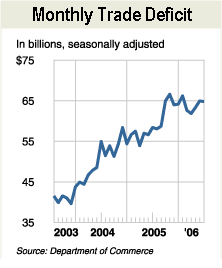 2. Unprecedented trade deficits. As Yahoo News reported, despite a modest drop from
last year's record high, the nation's trade deficit remains a staggering $700 billion:
Trade Deficit Up Significantly (July 12, 2007)
2. Unprecedented trade deficits. As Yahoo News reported, despite a modest drop from
last year's record high, the nation's trade deficit remains a staggering $700 billion:
Trade Deficit Up Significantly (July 12, 2007)
The deficit for May rose to $60.04 billion. The deficit with China rose to $20.02 billion, the biggest imbalance in four months. So far this year, the deficit with China is running 17.2 percent ahead of the pace set last year when the overall deficit soared to an all-time high of $233 billion. 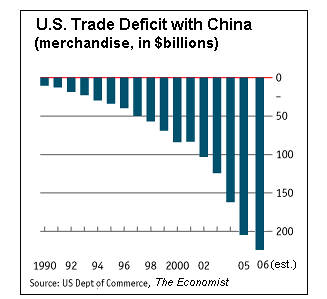 Nice, but the year is still far from over. Many observers have noted over the past five
years that no economy has sustained trade deficits of 5% of GDP or more for long--yet the U.S.
continues to run current account deficits well north of 5%. Will the chickens of imbalance and
debt ever come home to roost?
Nice, but the year is still far from over. Many observers have noted over the past five
years that no economy has sustained trade deficits of 5% of GDP or more for long--yet the U.S.
continues to run current account deficits well north of 5%. Will the chickens of imbalance and
debt ever come home to roost?
For one view on the way the trade deficit, the dollar and bonds are interconnected, please see Inflation/Deflation V: Bonds and the Dollar (January 12, 2007) 3. A sinking dollar. As I write, the Dollar Index is poised at 80.65, just a whisker above the drop-dead technical support level of 80, having dropped from 83 just a week ago. As the book The Dollar Crisis: Causes, Consequences, Cures And lest you fall for the hype about rising exports: let's do some simple math. The U.S. imports about $1.7 trillion, and exports about $1 trillion annually. The Commerce Department reported both imports and exports rose by 2%. That means imports rose by $34 billion, and exports rose by $20 billion--meaning the trade deficit just widened by $14 billion. Just to stay even, exports have to rise about twice as fast as imports. Reality: 1, cheerleaders: 0--again. 4. Generational war. As yesterday's entry outlined, retirees (defined as those old enough to qualify for Social Security and Medicare entitlements) are about to begin a war of attrition with taxpayers (many are both, of course, but if your entitlements far outstrip your tax bill, you're going to vote your bennies.) Either the taxpaying generations quietly swallow huge tax increases to fund the Baby Boomers' vast entitlements (see yesterday's entry) or they rebel, forcing some reduction in entitlement spending. My own view is on record for over two years: Boomers, Prepare to Fall on Your Swords (June 2005) Unfortunately, taxpayers will be fighting a two-front war, as hundreds of thousands of public employees have been promised retirement benefits and medical care coverage which is simply unaffordable without gargantuan tax increases and the slashing of other local government spending. As the public unions prepare to defend their entitlements with strikes, the public can only fight back by "throwing the rascals out" who try to raise taxes, and by refusing to cave in to the blackmail of public-union strikes. 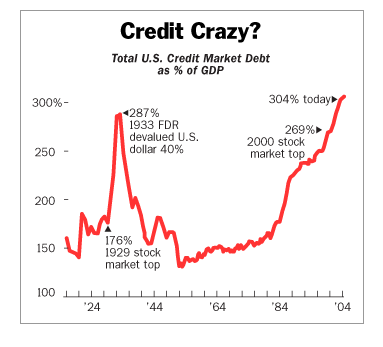
5. Unprecedented bubbles in all asset classes. Stocks, bonds, derivatives, real estate, art--you name it, it's in a bubble. Interestingly, the best returns of the stagflation years were made in precious metals (a hedge against inflation and a dropping dollar) and plain old cash, which was eventually earning 15% per annum in money market accounts. The root cause of all financial panics and depressions is of course runaway borrowing/skyrocketing debt, risk and leverage. Is the U.S. economy heading for a Great Unraveling? This chart suggests there is no other possible outcome for a debt/leverage/risk expansion which now far outstrips the stupendous imbalances of 1929. Thank you, Cory B. ($15), for your unexpected donation to this humble site. I am greatly honored by your support and your readership. All contributors are listed below in acknowledgement of my gratitude. This Week's Theme: The Great Unraveling What's Different Now July 12, 2007 We often read about "how it's different this time," meaning that prosperity will never end because, well, for the first time in recorded history, the business cycle has been banished for good. There'll never be any more down, only up, never any hangover, just permanent good times, no retrenchment of debt, just ever more risk-free borrowing. 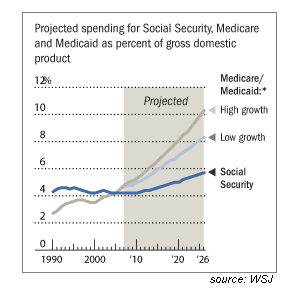 Well, the pundits got the first part right: it is different this time, but it's worse--much
worse, than it ever was in the past.
Here we have a little chart which guarantees certain financial doom for the U.S. Yes, this is
the double-whammy which will bankrupt the nation just as surely as the sun rises in the morning:
entitlements promised to 76 million Baby Boomers and out-of-control medical care costs.
Well, the pundits got the first part right: it is different this time, but it's worse--much
worse, than it ever was in the past.
Here we have a little chart which guarantees certain financial doom for the U.S. Yes, this is
the double-whammy which will bankrupt the nation just as surely as the sun rises in the morning:
entitlements promised to 76 million Baby Boomers and out-of-control medical care costs.
This combination is rather like a fission and a fusion nuclear weapon. A fission bomb explodes when a radioactive isotope of uranium is pushed together at high speed; a fusion weapon greatly amplifies the destructive force of the fission chain reaction by wrapping an isotope of hydrogen around the fission bomb. The spray of radioactivity from the fission causes the hydrogen atoms to fuse into helium, releasing tremendous energy in the process. 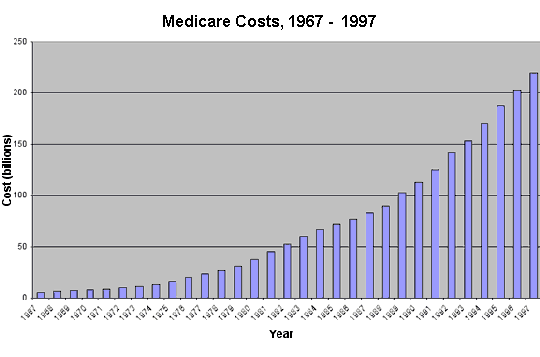 The staggering unending rise in all healthcare costs is like the fission bomb; now wrap 76 million
people hungry for their entitlements and you get a thermonuclear destruction of the Federal
budget and the U.S. economy. That's 25% of the entire U.S. population, and they start qualifying
for Social Security in 2008 (1946 + 62), and for Medicare in 2011. Roughly 4 million more people per year
are going to be tapping the Federal revenues from 2008 through 2029.
The staggering unending rise in all healthcare costs is like the fission bomb; now wrap 76 million
people hungry for their entitlements and you get a thermonuclear destruction of the Federal
budget and the U.S. economy. That's 25% of the entire U.S. population, and they start qualifying
for Social Security in 2008 (1946 + 62), and for Medicare in 2011. Roughly 4 million more people per year
are going to be tapping the Federal revenues from 2008 through 2029.
Rising healthcare costs threaten our entire economy as it is; We spend far more, but our health care is falling behind; Australia, Canada, Germany, New Zealand, U.K. spend less and do better job, studies say. It's become so well-known there's little more to say, but let's recap just how Third World our "healthcare" has become: "Ours is really is a sick-care system. We have tremendous technical capabilities to deal with people with serious illness," Thorpe said. He argues, though, that it is far more cost-effective to prevent people from getting sick or at least catch illnesses early through better monitoring.This is not to say that thousands of hard-working people aren't doing their best to care for patients--they are. The point is: how does the system help or inhibit that care, and is all of the billing affordable to the individual and the nation as a whole? If set out to design the worst system possible--horribly inefficient, dreadfully ineffective, astoundingly unfair, wasteful of resources, arcane in its bureaucracy, visibly unethical, stupendously corrupt and riddled with shameless profiteering, and larded with powerful disincentives to efficient care and egregious incentives for political meddling and profiteering by "providers" and drug pushers--this is the system you'd design. But never mind all that, because we've run out of time to dither over details--our system will bankrupt us while we argue about how wrong Michael Moore is about everything. It doesn't matter if socialized medical care is horrible, too, or if the states are going to start their own plans (with borrowed money)--the whole ship is going down the moment foreign entities stop funding all our debt by buying most of our bonds. Once we can't borrow enough to pay for it all--then we'll have to start dealing with reality. As the marketing slogan has it: But wait--there's more! Yes, all our local governments are facing stunning increases in the healthcare and pension costs of their retirees. S.F. incurs huge costs for public retirees Governments begin to grapple with unfunded health care. While a few municipalities are still reporting surpluses, the majority of state and local governments are facing pension and retiree healthcare increases which they have to fund out of tax revenues. In my neck of the woods, this "contribution" amounts to roughly 13% of the entire city budget: (and even higher in 2007) Pension Contributions Explosion Causes Berkeley Budget Woes: In 2005, $15 million of Berkeley’s $115 million general fund will pay for contributions to the California Public Employees System (PERS). Last year, the city spent $8 million on retirement benefits. The year before, when the state Legislature passed the bill that allowed Berkeley to improve the pension benefits, the city spent only $2.8 million.So the city's pension contributions rose from $2.8 million to $15 million in three years, and there's no end in sight to the rise? Hey, I'm all for rewarding law enforcement officers, but couldn't they wait to 62 like the rest of us? And couldn't there be some cap on total retirement costs, including healthcare and "after retirement consulting" double-dipping? The woes run even deeper if you look at the city payroll: Relative to the size of our population, the number of city employees is almost 3 times greater than other comparable East Bay Cities. Berkeley recently elected to purchase the 1947 Center Street Building at a cost of at least 28 million to house this ever increasing number of city employees. While Council members and staff publicly talk about a hiring freeze and a ban on overtime city departments continue to hire for replacements and even for new positions. Some employees who retire are also being rehired as consultants. They receive full pay through their pensions and also receive equivalent amounts or even more as consultants.This is "real life" for public employees: a fatter paycheck in retirement than when they were working, and a pension longer than their work career. And please don't tell me how underpaid everyone is; there are plenty of schoolteachers and police officers in my extended family, and $65,000 for 9 months work is not underpaid. Low-skill clerks at UCSF make $45,000 a year; that's also not "low paid." They get their medical benefits for life after a mere 5 years of employment, as do all employees of the City of San Francisco. Uh, can you spell "municipal bankruptcy"? In the last standard-issue downturn/recession in the early 1980s, the nation did not face an avalanche of retirees, nor was it in the grip of runaway medical expenses. Municipal retirees received affordable benefits, not retirements in which they receive more than their working pay. The Great Bull Market of 1982 - 2000 enabled cities and states to pay retirement benefits out of rising stock and bond portfolios; now that easy gravytrain of wealth is ending. Yes, it's different this time--but not in the way the cheerleading pundits blather about. Thank you, James R. ($25), for your thoughtful and quite generous donation to this humble site. I am greatly honored by your support and your readership. All contributors are listed below in acknowledgement of my gratitude. This Week's Theme: The Great Unraveling The Long Cycles of Prosperity, Decline and Upheaval July 11, 2007 Back in April I discussed a new book by author Terence Parker titled The Rhythm of War in a civilized world. I thought so highly of Mr. Parker's insights and concise prose (the book is only 80 pages in length) that I posted a link to his site www.warcycle.com in my recommended list (right sidebar). Please note that I receive no compensation from Mr. Parker should you buy a copy of his book. The Rhythm of War sets you thinking on "long cycles" such as those posited by Russian economist Kondratieff, whose ideas I have covered in Are We Poised on the Precipice of Another Age of Turmoil? (June 2005). Kondratieff's economic cycles can be metaphorically described as the four seasons: (spring = rising prosperity, summer = false prosperity, fall = decline, winter = depression). Mr. Parker suggests the low points in the cycle might be 1789, 1849, 1896, 1934 and 1995, the latter being extremely mild. Other observers believe we are approaching a 1929-type Depression, with the cycle before that beginning in the 1870s as the immense debts and stock market frauds perpetrated during the great rush into railroads collapsed and investors/speculators were wiped out. Kondratieff's insights were based on deeply human causal factors: the way in which greed creates bubbles of speculative excess and wild risk-taking, and the manner in which the generation which recalls the hardships of Depression passes away, removing any living cultural brakes on the pell-mell rush to new speculative heights. Mr. Parker adds another cycle to our understanding, one which he describes as swings from Nationalism to Individualism which pass through intermediate periods of "self and group." He supports this supposition with fascinating graphs of suicides and workers on strike, and identifies four points in the cycle: Realization, Self-Assertion, Self-Righteousness and Disillusion. Lastly, he describes a cycle of violence, in which he identifies three general types of war: wars of domination, wars of creed, and wars of self-righteousness. Mr. Parker observes that wars of self-righteousness occur at the end of periods of rising prosperity; examples include the American Civil War, World War I and the Vietnam war. Is there a better description of the Iraqi wars than this, a war of self-righteousness occurring at the end of a long period of prosperity? From the point of view of many, it is also a war of domination as well as a war of creed. With these cycles in mind, I've drawn a little chart of various cycles which have recently reversed direction: 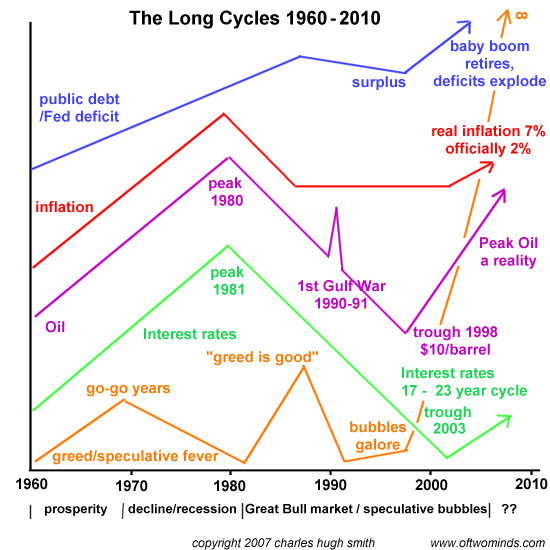
Do you observe how long-term positive trends have reversed direction? 1. The Federal deficit After leveling off and actually declining in the late 90s years of Federal surplus, the deficit is approaching a staggering lift-off as baby Boomers start retiring in their tens of millions, tapping Social Security and Medicare entitlements. 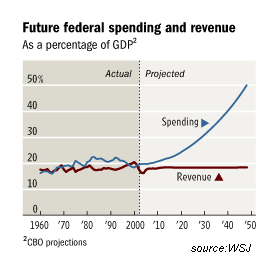
2. Interest rates After falling for 22 years, rates have been rising for 3 years, which means there's only 15-20 years more to go before they top out. 3. Inflation With money supply growing far beyond the actual economy and essentials like food, energy, healthcare and education rising by leaps and bounds, does anyone seriously doubt inflation is rising far faster than the phony official "core rate" of 2%? Note what happened last time inflation ran upward: stagflation, decline, recession, choose whatever label you prefer. 4. Oil Notice how oil (adjusted for inflation) dropped for almost two decades, with a brief spike during the first Gulf War. Now it has been on a relentless rise since 2000, with no end in sight as the realities of Peak Oil/depletion start taking effect. Note what happened last time oil rose in price: stagflation, decline, recession, etc. 5. Greed/speculative fever There were periods of speculative excess/greed in the past 50 years--the "Nifty 50"/Go-Go years of the late 60s, and the "greed is good" (as long as the taxpayer ends up with the S&L bail-out bill, hahaha) years of the 80s, but nothing like the present near-infinite rise of bubbles in global equities, bonds, real estate, derivatives, artworks, you name it. Want to get into the hot new real estate spot? Get thee to Mauritius, pronto! Hot new art field? Modern Chinese painters! Hot new furniture? Old school desks from the 60s! Yes, and you can find them right in your local school, because they're still there and in daily use! The textbooks are only 10-20 years old, so they're not yet collectable--but hey, you might be one of the first to score big if you start collecting them now. When you can barely tell parody from reality, then the speculative bubble is about to burst. Exactly what in this chart supports the idea that the boom time is set to continue for decades to come? Let's see: crushing deficits, check. Rising energy prices, check. Rising inflation, check. Rising interest rates, check. Speculative greed/bubbles are off the charts, check. When did all these conditions last occur? And what happened to the "permanent prosperity" of the 60s when they all changed course? It fell apart in a 15-year period of declining living standards, angst, stagflation and "creative destruction" of industries, livelihoods and wealth. Then all these negative trends reversed: money got cheaper every year for 20 years, oil dropped in cost for 20 years, etc. Will deficits suddenly drop away? Really? With 60 million people retiring? Will oil suddenly plummet in price, even as super-giant fields are depleted and 2 billion more people aspire to middle-class lifestyles? Will inflation suddenly decline despite massive inflation of the global money supply? Will interest rates drop even as the dollar threatens to break down? Bottom line: None of the trends essential to "permanent prosperity" have any likelihood of reversing their negative trendlines. Thank you, Lynn C. ($50), for your astoundingly generous donation to this humble site. I am greatly honored by your support and your readership. All contributors are listed below in acknowledgement of my gratitude. Note to past and potential donors: at the suggestion of a reader, I offer a free signed copy of my little novel I-State Lines as a small token of my appreciation to every reader who donates $50 or more, in either multiple donations or as one donation. It's not much, I readily concede, but it might be just the right thickness to prop up a wobbly table. And then, wow, you'll be glad you donated $50, because a rock-solid table is such a vast improvement over a wobbly one. This Week's Theme: The Great Unraveling Denial, Fragility and a Schizophrenic Culture Readers Journal Updated: read the latest from Harun, Michael, Protagoras, Albert and Chris--all thought-provoking, all excellent. July 10, 2007 I invite you to compare the picture of American prosperity as presented by the Federal government's (phony) statistics (incredibly low unemployment and inflation, rising wages and wealth, astonishing prosperity all around) and its chief shills, Ben Bernanke and Hank Paulson, and reality as captured by the following charts. 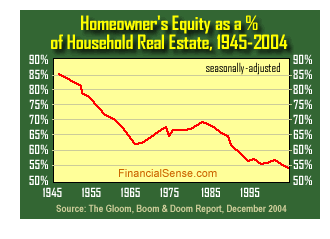 Consider this graph of homeowner equity. How can homeowner equity be plummeting in the
greatest real estate boom in recorded history, when tens of millions of properties have doubled
or tripled in value?
Consider this graph of homeowner equity. How can homeowner equity be plummeting in the
greatest real estate boom in recorded history, when tens of millions of properties have doubled
or tripled in value?
Gee, could it be that Americans have pulled money out of their houses even faster than they've risen in value? This is undeniably the case. As the following charts show, Americans have borrowed money /extracted equity at such a furious rate that it's not home equity which is rising but household debt. 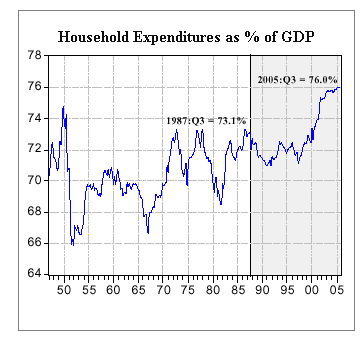 And what have people done with this borrowed money? Have they squirreled it away for their
retirement? If so, there is scant evidence of it; this chart suggests that
they've spent the vast majority of it on consumer goods and services.
And what have people done with this borrowed money? Have they squirreled it away for their
retirement? If so, there is scant evidence of it; this chart suggests that
they've spent the vast majority of it on consumer goods and services.
The proof of this free spending is everywhere: massively crowded airports because everyone is jetting everywhere, weak dollar be damned, fancy restaurants crammed to the gills, and of course huge shiny new SUVs and pickup trucks towing behemoth boats. I look at these new vehicles--nary a one with a tool box or other evidence of a working truck--and wonder: who can afford this? Not just the monthly payment, but the insurance and gas. I know some people who make enough to own them, people making $100,000+ per year--but they're too exhausted to be driving around on Saturday towing their boat. Heck, they're at work or doing laundry or just sleeping, trying to rest up for Monday. 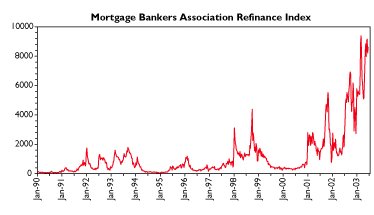 So who are these people flying to Europe, driving brand-new $30,000+ trucks and blowing $200 for
dinner? Yes, they're middle-class Americans--the ones with negative savings, tapped-out equity
and medicine cabinets full of medications.
So who are these people flying to Europe, driving brand-new $30,000+ trucks and blowing $200 for
dinner? Yes, they're middle-class Americans--the ones with negative savings, tapped-out equity
and medicine cabinets full of medications.
As we ponder the meaning of that enormous spike in re-financings--sure, people re-financed to get lower interest rates, but how many took out some cash at the same time?--let's consider another trend which we can see with our own eyes: a culture of individual identity based solely on the external markers of fame, prestige and wealth. 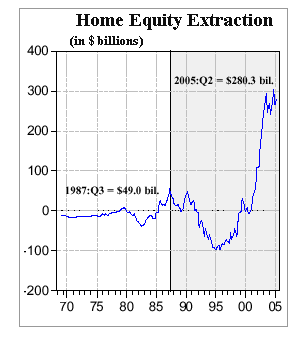 If you've been on the planet a few decades, you know Americans have always been obsessed with
celebrity and wealth. But never before were typical Americans so desperate for a fleeting
moment in front of the camera themselves. There were no "reality" shows decades ago, no people
groveling through disgusting indignities for their sweet glorious seconds of fame, or airing
their dirtiest laundry in order to be lectured by some smarmy "celebrity" therapist or judge.
If you've been on the planet a few decades, you know Americans have always been obsessed with
celebrity and wealth. But never before were typical Americans so desperate for a fleeting
moment in front of the camera themselves. There were no "reality" shows decades ago, no people
groveling through disgusting indignities for their sweet glorious seconds of fame, or airing
their dirtiest laundry in order to be lectured by some smarmy "celebrity" therapist or judge.
Hey, young ladies, take your shirt off! You'll be "famous" for a few seconds somewhere. Or leave your dorm room cam on while you undress. You might even get hundreds of subscribers if you convince your pals to join you prancing around in your panties. Guys, you can't "earn your moment of celebrity" quite so easily; you'll have to eat slugs and get muddy, and suffer humiliations no secure individual would even tolerate, much less volunteer for. I don't mean to suggest there's anything wrong with going to Hollywood to be a movie star or getting your pals together and forming a band; if you can make it on talent and perseverence, good on ya. And yes, this is the promise of "American Idol." But if we look a little deeper at "Idol," we realize what it really offers is a short-cut to fame without all those boring years of gigging and writing compelling material: just stand up, sing your little cover song, and voila, a recording contract and instant fame. Heady stuff, indeed. 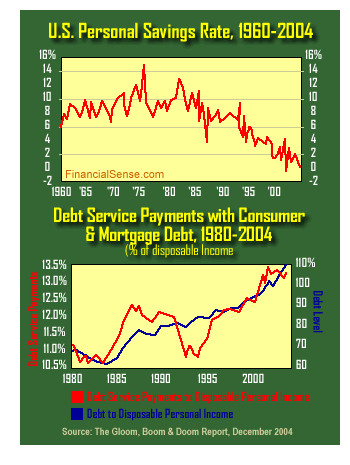 Hmm, if times are so darn good, why are personal savings plummeting and debt skyrocketing? Does
everyone borrow more when their wealth is supposedly rising like a balloon? (Some charts are a bit
outdated but the trend remains unchanged.)
Hmm, if times are so darn good, why are personal savings plummeting and debt skyrocketing? Does
everyone borrow more when their wealth is supposedly rising like a balloon? (Some charts are a bit
outdated but the trend remains unchanged.)
And speaking of heady stuff, let's consider why so many Americans are on drugs. On the face of it, shouldn't such prosperous people be happy and secure? If you step back, you have to wonder: why are tens of millions of Americans taking anti-depressants and anti-anxiety medications, and tens of millions more addicted to cocaine, heroin, marijuana, alcohol and nicotine? Like everything else in our Potemkin Village society, it's all just beneath the surface. People don't like to admit that they're not Superman or Superwoman, so it's only your close friends who will tell you. But check out who's a pothead, who's on anti-depressants, and whose underage kids are drunk--ho-hum, just another normal day in sedated, medicated, drugged America. You think I'm exaggerating? Then ask your friend who's gone through an addiction or drug rehab program (yes, it may surprise you who you know who has), and ask them about the nurses who are coke-heads, or the software engineers on smack, or the folks who have to have OxyContin, that favorite "relaxer" of right-wing radio demogogues. If you're in law enforcement--well, I'm not telling you anything new. You've seen even worse, the guys doped up on ice (crystal meth), and boy, are they a piece of work. I'm not questioning the value of anti-anxiety and anti-depressants--I know from the experience of those close to me that they can make a critical, positive difference in the lives of those suffering from psychiatric disorders. What I am questioning is the high levels of reliance on powerful medications/drugs, prescribed and otherwise, by what seems like an extraordinary number of Americans. Perhaps all humans are unhappy and stressed-out-- but doesn't the culture they inhabit have some influence? 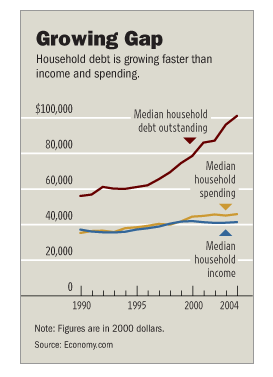 Put yourselves in the shoes of a visiting anthroplogist and look at our society at face value.
Yes, all humans like to get happy--beer was invented in Egypt a long time ago, and hey, the
residents of Middle Ages Europe had to drink beer because drinking the water would kill you. Yes, the
records of cathedral construction crews shows that the guys' portions of ale were spaced out
through the day so they wouldn't get too inebriated to work.
Put yourselves in the shoes of a visiting anthroplogist and look at our society at face value.
Yes, all humans like to get happy--beer was invented in Egypt a long time ago, and hey, the
residents of Middle Ages Europe had to drink beer because drinking the water would kill you. Yes, the
records of cathedral construction crews shows that the guys' portions of ale were spaced out
through the day so they wouldn't get too inebriated to work.
(The Chinese discovered that boiling water for tea was another pathway to safe hydration, and I think that may have been part of why they were so far ahead of the Europeans in the Tang Dynasty 700-900 A.D.) But our objective anthropologist notes that the water is safe to drink in the U.S., and people aren't just having a social drink to relax with friends or after work--they're bombed, doped, medicated, blitzed, day after day, apparently just to survive. What does this say about their culture and society? That it's "normal" and "healthy"? No objective observer could possibly conclude that unless they were in massive denial (and smashed to boot). No, you have to conclude that this is a society under extreme duress, a culture in which individuals are feeling tremendous stress as a result of the double-bind they live in: you are only worthy if you go to a prestigious university, make tons of money, drive a luxury vehicle, are famous /recognized as wonderful somewhere, are slim, athletic, good-looking, talented, and a perfect parent with perfect kids--and yet most of us are average-looking, with average intelligence and drive (I raise my hand here) and average everything else, too (my hand is still up). Because we live in a college town (okay, a prestigious university town), we do know super-acheivers. For example: graduated from super-selective law school a semester early, was flown to London all expenses paid for a job interview, was hired at a starting salary of $150,000 or so and moved to London. Good on ya, girl! But is this individual happy? We hope so, but if she is, it's not because of her apparently perfect career--it's because she found a job which matches her character and interests. The number of unhappy attorneys is legion. (Oh, and California has the nation's only 3-day long Bar exam. Good luck on that, because they only allow 50% of the exhausted students to pass. The test gets harder and harder every year to raise the bar--pun intended.) Does anyone else see a disconnect between the frenzied drive to attend a private college which costs $40,000+ a year and the fact that tech heroes Bill Gates and Steve Jobs did not finish college? This smacks of a culture so fearful of failure and worthlessness that every ounce of "prestige" must be scrounged like the last scrap of bread in a famine. Yes, it's important to go to college or acquire a trade/skill--I am only questioning why so many people choose a lifetime of debt in order to go to a private school when a perfectly good public university is probably close at hand. (And if you work your way through, your grades will suffer, but with some roommates and a cheap lifestyle you'll get your degree with a modest loan or maybe even no debt rather than a mountain of debt.) Is this a culture of secure individuals who don't need external props for their identity and sense of self, who have the confidence to make their own lives and livelihoods without a bunch of paperwork or gew-gaws proving they're Superman or Superwoman? No, it is not. It is a society of adrift, fearful, insecure, stressed-out, unhappy, fragile, vulnerable people seeking external props and cures for what can only come from within. Correspondent Fred Roper recently recommended Maxed Out: Hard Times, Easy Credit and the Era of Predatory Lenders. Along the same lines, there's a new book titled The Trap: Selling Out to Stay Afloat in Winner-Take-All America As an example of insecure consumers caving in to the commercialization of identity, there's One Perfect Day: The Selling of the American Wedding And as an example of how community identity is also enslaved to the "prestige of a major league sports team," there's Field of Schemes: How the Great Stadium Swindle Turns Public Money into Private Profit Bottom line: in an era of supposedly unparalleled, widespread prosperity and wealth creation, the financial and inner reserves of many Americans appears vulnerably thin. Somebody profited from originating all this debt, but nobody forced anyone at gunpoint to borrow it, either. The dis-ease lies deeper than predatory lenders; they are the pushers, but who's the customer? And why? Thank you, my friend Mike D. ($25), for your generous donation to this humble site. I am greatly honored by your support and your readership, which despite our history of treasured friendship remains entirely optional. All contributors are listed below in acknowledgement of my gratitude. This Week's Theme: The Great Unraveling Our Schizophrenic Media July 9, 2007 This week's theme is The Great Unraveling, in which I present the case that our descent into another Great Depression is close at hand and that the forces behind that descent can no longer be hindered, much less stopped. And lest you think that doom-and-gloomers have all the fun, this will be followed by a look at the Great Awakening which will take root in the depths of the despair and conflict which will be our lot during the worst of the Great Unraveling. "The Great Awakening" has spiritual antecedents in American history, but I employ it in a larger context; though a spiritual renewal is undoubtedly part of the context, religious and spiritual do not share the same meanings. For instance, a gargantuan mega-church that cost millions to build is undoubtedly religious, but its spiritual value remains questionable--and indeed, may become more questionable as poverty and distress become ever more widespread. 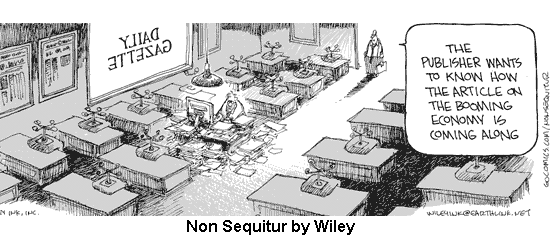
Let's start with the media, and specifically the print media. Few people expect much of television, radio or Internet-generated news; virtually all the "news" in these media flows from the print media. The headlines in the morning paper generate the "news" on TV; "breaking news" consists of "if it bleeds, it leads" crime and disaster coverage (throw another Christian to the lions, Centurion! The mob, I mean audience, is getting restless!) Thus the only media with any reputation for in-depth investigation is the print media. TV news makes some laughably inept attempts at "investigating" local issues like drivers education and the like, but let's state the obvious: if the nation depended on local or broadcast television and Yahoo! headlines for its analysis and investigative reporting, our descent to Third World status would already be complete. Alas, all is not well in Print-Media-Land. Beseiged by Google (Engulf and Devour While We Try Not To Look Too Noticeably Evil) and the explosion of Web and alternative media "channels," its bread-and-butter classified ad revenue gutted by Craigslist, the print media has taken a one-two punch to its glass jaw: declining readership and declining ad revenues. This has created a double-bind which has in turn spawned a Media Scizophrenia. Double-bind is a term coined by Gregory Bateson, British/American anthropologist, social scientist and general purpose intellectual (Here is his wikipedia entry). A double-bind is a cousin of Catch-22: a contradictory message or injunction which cannot be resolved. In some families, such impossible-to-fulfill injunctions can lead confused children into schizophrenia. The concept/mechanism can also be at work on a society-wide basis; for instance, "It is easier for a camel to go through the eye of a needle than for a rich man to enter the kingdom of God" (Matthew 19:24) versus the message that one's value as a human being rests entirely on who has the most toys, the best botox treatments, etc. One of the best (short) books on how this works is Politics of Experience (OK, enough of indulging the aging philosophy major.) Bottom line: here's the double-bind for the print media: to keep our advertisers, we must lie, but to keep our readers, we must report the truth. The double-bind is especially visible in real estate coverage. Every shred of good news is duly reported on the front page ("Housing starts rise by .006%," "Prices still Rising in London and Boise") while troubling news ("house sales plummet by 36%") is buried inside, and generally accompanied with happy-happy cheerleading ("This is the bottom, for sure, absolutely guaranteed 100%," said spokesman Lying Whipsnade). On a larger scale, this pattern is visible on most front pages. In my own hometown newspaper, The San Francisco Chronicle (which just laid off 25% of its editorial staff), the front page has been stripped of important news in favor of "dumbed down" fluff coverage of topics such as "Chocolate is good for you" (huge photo dominated front page above the fold) and the All-Star Game (overpaid steroid-pumped athletes with absolutely no loyalty to any community gather to go through the motions of a game). Is this the most important news of a nation at war, a nation with a multitude of critical challenges, and a nation teetering on the edge of financial ruin? Chocolate and baseball? Please, spare me the lectures on the stunning importance of "America's game." I attended a San Francisco Giants game a few year ago, and was appalled by the outrageous expense involved. A plastic cup of beer was $7.50 (not even a pint, more like 8 ounces) and a handful of peanuts cost $6 (or was it $10?). Then there was the public transport tickets (or parking, take your pick) and the insanely expensive ticket itself for mediocre seats. Since when did seeing a routine baseball game require $60 (six first-run movies, 24 DVD rentals, 3 books) to show up and have a tiny beer and a handful of peanuts in lousy seats? Of course $100 will barely get you in the gate for an NFL game. Rather than glorify this excess, the newspaper should have questioned just how positive this money-driven mania is for the city and the nation. Ah, but the game will bring millions in revenues to the city, and that's the name of the "real game." In fairness, the paper did run an excellent article questioning the value of publicly subsidized mega-costly stadiums in the Sunday edition: Are stadiums worth the high price? This piece raises the questions which should have been raised on page one. But at least the underlying issues were addressed: should citizens pay for $500 million stadiums so private teams can profit from citizens' misplaced "civic pride" and largesse? Here we have the double-bind: they can't tell the truth lest they lose their revenue base, but they have to offer some occasional reporting to justify their existence/keep some readers. Can a nation teetering on the precipice be well-served by a schizophrenic press? Yes, there are still reliable sources of information and analysis (Bloomberg, et. al.), but how healthy can the nation be when the bulk of its media is at best schizophrenic and at worst, already catatonic? Thank you, Kip S. ($25), for your unexpected and very generous donation to this humble site. I am greatly honored by your encouragement and by your readership. All contributors are listed below in acknowledgement of my gratitude. This Week's Theme: The Shifting Sands of Lies Are People Sensing Something Is Deeply Amiss? July 6, 2007 Correspondent Bill Murath sent in these thought-provoking comments on group consciousness and the tendrils of evidence that Americans are sensing something is deeply amiss: It seems on a large scale people are intuiting a change. I am talking more mainstream folks. My buddy Mark whom I am working with is moving back to a farm in North Dakota in a few months. He was up visiting for his parents 50th anniversary and said a whole lot of his cousins who had left the state were moving back for no particular reason. His uncle, a vietnam vet who lost a leg there, just went out with his 2 boys and all bought pistols. For no particular reason. He never owned a firearm in his life.Correspondent Harun I. (a U.S. Navy veteran who served many years in elite units) had these comments about the July 4th entry: I would also like to thank General Taguba. He sacrificed his career for something bigger than all of us, the truth.Are Americans sensing something the mainstream print media and the TV propaganda machines are avoiding? Why would someone move back to the agricultural heartland of the nation? How about to be close to the food supply, or for the security/protection of a known community? Why would a combat veteran who has never owned a firearm suddenly arm his family? Is there any reason but defense against a serious threat? And what would cause someone to fear anything in a time of "stock market hits new highs" and "global prosperity that will last for decades?" Could all that be basically a Ponzi scheme, as Bill Murath suggests, built on a foundation of lies? When I come across anonymous (always anonymous, it seems) defenders of this administration online, their words have the hollow ring of desperation: "I support my President." Did this individual say the same when Clinton was President? If you're pledging absolute devotion to the office, no selection is allowed: you either support the President all the way down the line or you don't. Somehow I suspect these "support the President" zealots did not support their President during the years 1992-2000 with the same absolutist fervor. Another slice of desperados brings up Clinton's lies from 1998, as if one President's lies justify another's. Every lie is wrong. Bringing up a past lie does not justify a current lie. The people anxious to dig up past lies are like the spoiled bratty child who defends his theft of a candy bar with the words, "Johnny stole one, too!" as if others' crimes justify their own and absolve everyone of responsibility. Sorry, boys, they don't. Correspondent Michael Goodfellow sent along this article on just how decimated those Bear Stearns hedge funds are: You know, the ones which are "contained" and "no problem"? Buyers avoid Bear Stearns' cut-priced sale: Investors in the worse-hit of two stricken Bear Stearns hedge funds are offering to sell their holdings for as little as 11 cents on the dollar but still finding no buyers, according to unfilled trades on Hedgebay, a secondary market for funds.Does any of this strike you as just a tiny wee bit worse than the mainstream U.S. press suggests? A nickel on the dollar means a 95% loss; 30 cents on the dollar for the "high quality" tranches means 70% loss. How much money do you reckon will be lost as the hedge funds, banks and pension funds reporting huge losses turn into dozens, then hundreds or even thousands? New correspondent E.S. offers an excellent summary of what he succinctly terms "the gradual unraveling" we are now observing: What you write about is the gradual unraveling of what was once a great country.Well said, Bill, Harun and E.S.--thank you for the insightful commentaries. Just in case you might think I am a Johnny-come-lately to the bubbles bursting and the rot at the center of our society, please glance at the following entries, and note that I only started my blog in May 2005: Housing Bubble? What Bubble? Just Look (June 29, 2005) The Housing Bubble III: Pop! (August 20, 2005) Since E.S. was kind enough to mention my many years as a carpenter/wood butcher, please glance at these two entries from last year on the construction defects coming to a GarageMahal near you: Construction Defects: The Flood to Come? (June 1, 2006) Construction Defects, The Flood to Come, Part II (June 3, 2006) If you have a little time on your hands, please skim the entries listed in the 2007 archives (by subject) and the 2005-2006 archives (by subject); many relate to the critically important topics raised by these correspondents. Thank you, Mark S. ($10), for your generous and unexpected donation to this humble site. I am greatly honored by your support and your readership. All contributors are listed below in acknowledgement of my gratitude. This Week's Theme: The Shifting Sands of Lies When Lies Become Normal, Is Truth Dead or Just in Hiding? July 5, 2007 Correspondent James C. recently described how "fudging the numbers" is ubiquitous in our society, and how the fudging only forstalls the consequences: (emphasis added) Our whole society is based on fudging the numbers. Whether is be reported inflation, GDP, the value of stocks and CDO's or the efficiency of certain drugs, there is some degree of cloudiness in all the numbers. By the way, health risks are calculated the same way. If two people per thousand die of a "X" disease and some bad habit increases ones risk of dying of "X" disease by 50%, then out of 1000 people with this bad habit 3 would die of "X" disease. Hmmm, let's have a beer and enjoy life!James C. raises some critical, long-term issues with enormous consequences for decades to come. If a drug company misrepresents/fudges the efficacy of its "wonder drug," isn't this a lie? And if a government and/or elected Administration tells the public Medicare, or a war, or a giveaway to special interests, is "affordable," even as it saddles our children and their children with a mountain of unaffordable debt, isn't this also a lie? And if you "fudge the income" on your "no-document" mortgage application, isn't this also a lie? And if you "fudge" the appraisal value on a property at the "request" of the lender, isn't this also a lie? And if you process this application and appraisal, than aren't you lying, too? And when a realtor assured the borrower that they could re-finance to a fixed-rate, low-interest mortgage whenever they wanted, wasn't this a lie? And when the realtor assured the buyer that "real estate never goes down, it only goes up," wasn't this a lie, too? (The statistics of the early 90s retreat in home prices is not a secret.) And if you assign this mortgage a low-risk AA bond rating when it becomes part of a mortgage-backed security and CDO, then isn't that a lie? And when you, the broker/banker, package and sell this lie to a pension fund as a "safe, high-return" investment vehicle, isn't that a lie? And when a government agency sworn to protect consumers and provide oversight as per the law does nothing to question this contraption of lies, aren't its employees and leadership complicit in the lie? I think you can see where this leads: the entire housing bubble is constructed on lies. The real estate, home building, lending and investment banking industries have all known the bubble was inflated with one rickety, ill-advised lie after another, as did the government agencies supposedly put in place to protect citizens from predatory lying. Yet nothing was done or said except by a handful of skeptics in the blogosphere, all of whom were mocked as "doom and gloomers." Now the chickens are coming home to roost, and years after we raised a clarion call of doubt and skepticism, the fumbling mainstream press is suddenly alive with stories about "the subprime mess." Where were these intrepid editors and reporters two or even three years ago? As a child, I was taught there is a sharp line between truth and lie. If you steal a candy bar, you are guilty of theft, regardless of the value. You can't fudge the theft by saying, "But it was only a candy bar," or "I didn't steal it from a person, but from a rich corporation," or "Everyone steals from the government." If you misrepresent the truth, you're a liar. There is no "fudging" this reality. And here we have entire trillion-dollar industries built at least partly on lies--lies which are passed along because they benefit the industries' profit margins. Now as it all unravels, I wait in vain for someone, anyone, to say something simple and direct: It was wrong. But we live in a society so debased from truth that this widespread, ubiquitous lying by realtors, lenders, government agencies, investment bankers, etc. isn't considered wrong, or a violation of the principles of honesty and trust which built the nation; lying is now seen as utterly unremarkable, as "business as usual" -- just as it is in a corrupt and venal third-world or Communist regime that we as a nation like to place ourselves above. But does this moral superiority have any basis in reality? If business leaders like Jack Welch (former CEO of General Electric) are pleased to pontificate on the glories of American capitalism and opportunity week after nauseating week, we have to ask: does Mr. Welch feel any responsibility to excoriate the liars or "speak truth to power" about the lies at the heart of trillion-dollar industries? Isn't his silence, and the silence of all the other puffed-up, know-it-all pundits blathering on endlessly about how great everything is and how prosperity is "different this time" feel any responsility to the truth? And since they so clearly have avoided addressing the veritable pyramid of lies this bogus "prosperity" is based on, aren't they, and the media masters who pay them for their punditry, also complicit in the lies? Let me put it this way: if the kid you're with steals a candy bar, and gives you half, aren't you complicit in the theft? And when you lie to your Mom and Dad about where your half of the candy bar came from, aren't you a liar, pure and simple? Ours is often categorized as a "deeply religious" nation, but this appears to be yet another self-serving fabrication. I grew up in a family where one's religious beliefs were kept ptivate, not trumpeted over the airwaves. I came from a family of missionaries, some of whom died while serving their mission in Africa. My aunts and uncle were born in El Salvador, where my grandfather and grandmother were serving as missionaries. I am not going to foist my beliefs on anyone, or parade around claiming some high righteousness; but I do know that lying is not "fudging," and "fudging the numbers" in any way, shape or form is lying. And I know that everyone down the line who knows of the lie and says or does nothing to reveal it is also a liar. We have become a nation of self-satisfied liars, as every report out of Iraq, as every report about the lending bubble, as every report about investment bankers and rating agencies scrambling to cover their tracks, all reveal. And every editor who plasters a story about baseball or chocolate or pets on the front cover of his/her newspaper/media outlet rather than an investigation of the lies which will bleed us for decades to come, is complicit in the lie, for he/she is the kid who's accepting the stolen half of the candy bar and saying nothing. The candy bar is real estate advertising, and retail advertising, and all the profits flowing into "corporate." But we may find as a nation that there is a cost to blithely accepting a pyramid of lies. We may find truth hasn't been destroyed, but only driven into hiding. And when truth emerges, a hard rain is gonna fall. Thank you, my friend Charlie R. ($20), for your generous donation to this humble site. I am greatly honored by your support and your readership, as you were one of the first to read and contribute your thoughts and experience. All contributors are listed below in acknowledgement of my gratitude. This Week's Theme: The Shifting Sands of Lies July 4th Special: The Civilian War on Military Truth July 4, 2007 If you think this Administration is doing a peachy job managing the war in Iraq, and/or you distrust/loathe the U.S. Military, prepare for an opposing view. Is there anyone left in the U.S. who doesn't acknowledge this war was planned, entered and executed on a foundation of knowing, calculated-to-con-us lies? Hopefully not. Is there anyone who doesn't know the C.I.A. and other intelligence services sworn to serve the nation were pressured to either support or at least not contradict our civilian /elected administration's chosen list of lies and fabrications? Is there anyone who doesn't know that Vietnam War veteran (wounded in combat, disabled by any standard) General Eric Shinseki was fired and then treated like scum by his civilian/elected Overlords for daring to speak the truth, that the U.S. needed 300,000 to 400,000 ground troops to pacify and control Iraq after the war--precisely what our intelligence services had concluded? Here's my July 4th thought: our elected officials who are in charge of the nation's military--and by this I mean our Commander in Chief, former Scretary of Defense and on down the line from there-- are unworthy to lick General Shinseki's boots, much less attempt to humiliate and discredit him because his judgment on military matters was at odds with their politically calculated expediencies. I am also offended on behalf of the many Asian-Americans who have served in this nation's Armed Forces. The 442nd Regimental Combat Team/100th Infantry Battalion, comprised of Japanese-American volunteer troops and Caucasian officers, earned the most combat decorations of any unit that served in World War II. If you're ever in downtown Los Angeles, I invite you to visit the 442nd/100th's "Go For Broke" Monument. ("Go For Broke" was the Hawaii-inspired motto of the units; many volunteers left Internment camps to join.) My wife's uncle's name is engraved on the list of those who served. Here is a description of the unit's service: Composed of all volunteers, the 442nd fought in the Italian campaign. The 442nd is the most decorated unit in United States history. In less than two years of combat, the 442nd Regimental Combat Team earned more than 18,000 individual decorations including one Medal of Honor, 53 Distinguished Service Crosses, 588 Silver Stars, 5,200 Bronze Star Medals, 9,486 Purple Hearts, and eight Presidential Unit Citations (the nation's top award for combat units).Now you can perhaps partially understand my outrage over the way General Shinseki was treated by this pathetic parade of arrogant liars, none of whom served a day in combat but who have been pleased to lecture the nation about duty and sacrifice for 7 long, hypocritical years. Meanwhile, General Shinskei is serving as the national spokesman for the Go For Broke National Education Center, furthering the nation's understanding of what sacrifice, valor and honor really mean: The Go For Broke National Education Center is pleased to announce that General Eric K. Shinseki (U.S. Army, Retired), a Vietnam veteran who went on to serve as the 34th Chief of Staff, United States Army, has agreed to serve as the Go For Broke National Education Center's national spokesperson. In this capacity, General Shinseki will help to ensure that the significant, but little-known, contributions of Americans of Japanese Ancestry during World War II are understood and remembered.I have many Filipino-American friends, and as a result I am also deeply offended by the way the dishonorable pack of liars in the White House and Pentagon have treated another U.S. Army general whose sworn duty was to the nation, not them: Antonio Taguba. The entire story can be found in this New Yorker piece by Seymour M. Hersh: The General’s Report: How Antonio Taguba, who investigated the Abu Ghraib scandal, became one of its casualties. The story is by now depressingly similar: a career Army officer fulfills his duty by telling the truth, and is promptly punished and sent packing by the arrogant politicos who have so badly mismanaged the terribly serious business of war. "Here . . . comes . . . that famous General Taguba—of the Taguba report!" Rumsfeld declared, in a mocking voice. The meeting was attended by Paul Wolfowitz, Rumsfeld’s deputy; Stephen Cambone, the Under-Secretary of Defense for Intelligence; General Richard Myers, chairman of the Joint Chiefs of Staff (J.C.S.); and General Peter Schoomaker, the Army chief of staff, along with Craddock and other officials. Taguba, describing the moment nearly three years later, said, sadly, “I thought they wanted to know. I assumed they wanted to know. I was ignorant of the setting."The setting being a group of political hacks who don't want the public to hear the truth about anything, lest their own lies, deceptions and dishonor be revealed. "I’ll talk to you about discrimination," Taguba said one morning, while discussing, without bitterness, his early years as an Army officer. “Let’s talk about being refused to be served at a restaurant in public. Let’s talk about having to do things two times, and being accused of not speaking English well, and having to pay myself for my three master’s degrees because the Army didn’t think I was smart enough. So what? Just work your ass off. So what? The hard work paid off."If this doesn't make you want to send the entire Administration from the President on down to Abu Ghraib for high treason, then I recommend you read the entire article--carefully. Many of you may not know that military service has long been a proud tradition in the Filipino-American community; you may also not be aware that like African-Americans, prior to World War II, Filipinos were only allowed to serve as wardroom staff--waiters and kitchen staff. It was only after the War, and the many sacrifices made by Filipino troops--many of whom rescued or aided American soldiers and airmen fighting in the Phillipines--that these limits on service were raised. To have such a fine, honorable citizen and Army officer denigrated and shoved into retirement by a pack of liars is more than I can stomach. I don't care who takes over as President in January 2009--I will cheer the passing of this arrogant dishonorable collection of liars and shameless political hacks. How long it will take to repair the damage they have inflicted is unknown, but it will be a long time. No one has to serve in the U.S. Armed Forces; it requires a devotion to duty not many of us possess. To have those who have served our nation their entire lives insulted by an arrogant, smirking pack of shameless liars--I weep for our nation and those so dishonorably discredited by those unworthy of any office. Oh, and when the global Depression grabs the U.S. by the throat in a year or two, you can thank this same pack of liars for that, too. (See below for details.) Thank you, my friend Steve T. ($33), for your generous donation to this humble site. I am greatly honored by your support and your readership, which despite our 34-year history of treasured friendship remains entirely optional. All contributors are listed below in acknowledgement of my gratitude. This Week's Theme: The Shifting Sands of Lies Lies, Corruption and Deception in the Global Village July 3, 2007 NOTE: Readers Journal updated--great commentaries from a host of interesting perspectives, and a new satire from Protagoras (see right sidebar). Many of our correspondents are exceptionally well-informed and experienced. One such is J.B. who had these observations on the reliabiliy of financial data from overseas firms. J.B. was responding to an entry here on tainted/defective imports from Asia; his comments reveal that all the various shades of lying--omissions, claims of ignorance, deceptions, corruption, etc.--are not limited to foodstuffs but are endemic to the world of finance as well. You know whenever I see a company run by anyone outside of Germans, Scandinavians, Canadians and English, you know I do not believe a word they say (not that the above group is exempted but let us say the degree is not quite as severe).But isn't the entire "emerging markets miracle" of skyrocketing stock prices based on the financials of these overseas companies? What can we make of the "miracle" if the numbers are untrustworthy? By that I mean, would the financial reports of these emerging-markets high-flyers withstand a fair and honest audit performed according to the accounting standards which regulate U.S. public companies' reports? My own reading on the subject suggests that privately, nobody with any experience in the field would stake their career or money on the reliability of most overseas companies' financials. It's just one of many "dirty little secrets" that's tolerated in order to make as much money as possible in the least amount of time, i.e. before the entire rotten structure blows up/collapses. Moving back to food, it is worth recalling that abysmally unhealthy food processing was rampant about a century ago in the U.S. Upton Sinclair's 1906 expose, The Jungle Let's check back in on the latest wave of findings regarding food imports from China: Firms increase scrutiny of Chinese ingredients: As imports climb, companies trying to head off problems In other words: since the governments of China and the U.S. have both failed U.S. consumers, U.S. companies are finally waking up that it's their responsibility to vouchsafe for the safety of their products. U.S. Detains Farmed Seafood From China. But it's all safe now. Right. Chinese fish import ban might affect markets; Country supplies lots of frozen shrimp and catfish to U.S. Tainted Toothpaste Found in US Prisons; safety issues widespread. Also Wednesday, Beijing police raided a village where live pigs were force-fed wastewater to boost their weight before slaughter, state media reported.In other words: you can't trust Chinese suppliers, Chinese government agencies, U.S. government agencies or the U.S. companies importing the food products. What possible actions are going to establish a level of accountability and trust which would cause you to risk your life and start buying Chinese tires, toothpaste, seafood, etc. again? Realistically speaking, the system is so broken it seems impossible that any such verifiable trust can ever be established. Think this through: The U.S. corporation insists that the products are inspected and certified. Wow, great oversight here. Ah, but the tainted/adulterated food has already been inspected and tagged as safe. How exactly do you get around this? You can't, unless you post the equivalent of an FDA inspector at every food plant in China--and the inspector would have to be a native speaker, and politically powerful enough to be protected from threats. If you think this is possible at any price, please read on: China Faces a New Worry: Heavy Metals in the Food: (Wall Street Journal, subscription required but you can always read it for free at the Library) 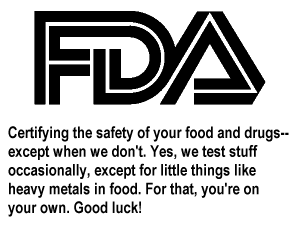
Concerns are mounting internationally as China plays a growing role in the global food industry. The country's exports currently account for about 12% of global trade in fruits and vegetables. China's agricultural exports to the U.S. rose to $2.26 billion in 2006 from $133 million in 1980, according to the U.S. Department of Agriculture.In summary: the health of the food supply system in China is compromised at the systemic/fundamental levels of soil, water and air. The government does not have the resources to adequately test, inspect and enforce safety regulations on tens of thousands of producers. Our own government has extensive food safety agencies--take a look at National Food Safety Programs for a complete list--but if they can't test any Chinese food products for heavy metals, it's clear they are overwhelmed by the task. And if you know the products aren't being tested by a trustworthy agency, then why put the product in your body? Is the savings (if any) worth your health? Bottom line: hey, if you have to lie to make a buck, then you lie. The hapless consumer / investor is far, far away, and is powerless to come after you. So why stop lying? Thank you Steve W. ($25) for your generous donation to this humble site. I am greatly honored by your support and your readership. All contributors are listed below in acknowledgement of my gratitude. This Week's Theme: The Shifting Sands of Lies An Economy and a Stock Market Built on Lies July 2, 2007 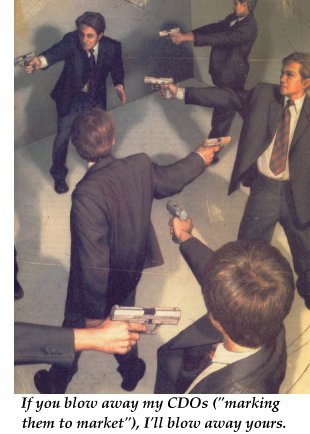 What can you say about an economy and a stock market which depends totally and completely
on the sustaining power of outright, blatant lies?
Lest you think I overstate the case, please read BusinessWeek's surprisingly candid
feature,
Mutually Assured Mayhem
What can you say about an economy and a stock market which depends totally and completely
on the sustaining power of outright, blatant lies?
Lest you think I overstate the case, please read BusinessWeek's surprisingly candid
feature,
Mutually Assured Mayhem Wall Street is on edge, scrambling to buck up Bear Stearns and avert a domino-effect debacle. Allow me to summarize: the entire credit/lending bubble which has long powered the housing, bond and stock markets is in danger of collapsing--unless the lies are maintained. What is the lie? It's simple: what CDOs and mortgage-backed securities are actually worth. You read a lot about "mark to market" now, and all this means is that for a security which doesn't trade on the open market, any value can be claimed by the owner. Once the security is actually put on the sales block, however, a market value is quickly identified. All similar securities can then be "marked to market" i.e. assigned a true market value rather than a made-up value-- also known as a lie. The analog might be a collection of baseball cards of varying quality and rarity--much like an MBS or CDO based on hundreds or thousands of mortgages of varying risk, interest and quality. The owner of the baseball cards can claim a value of $1 million, until such time as the collection goes up for auction. Then, experts pore over each constituent part and calculate a reasonable valuation based on similar products which have been traded. The market value will also depend heavily on the market sentiment at the time of auction; collections which might have sold for $100,000 in a risk-averse, tight-money environment could be worth a lot more in a loose-money, euphoric environment. The reverse is also true. Lest you think I overstate the losses, please read this report from Bloomberg: Bear Stearns Rivals Reject Fund Bailout in LTCM Redux: Bear Stearns may dissolve the second fund after more than $600 million of investors' money dwindled to less than $200 million. 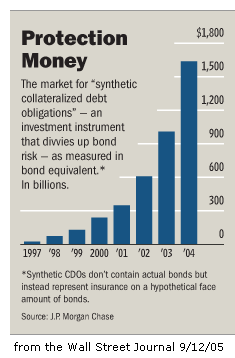 That, my friends, is a 2/3 loss.
That, my friends, is a 2/3 loss.
In a desperate attempt to save themselves, other firms are piling lies on top of lies. For instance; Lehman Brothers analyst says Bear Stearns loan does not threaten earnings. Oh, really? You can suck a $400 million loss on one fund and rescue another fund with a $3 billion capital infusion, yet your earnings are unimpaired? Call the Vatican, a miracle has occurred! Then there's a third layer of lies from the ratings agencies. To continue our baseball card analogy, the ratings companies (Moodys, Fitch, etc.) have examined your collection of cards and warrent that your cards are in excellent condition and the ballplayers' signatures are authentic, backing up your valuation estimate of $1 million. But when the collection comes up for auction, it's quickly noted that many cards are in poor shape and the signatures suspect. In other words, the ratings agency lied about the quality and value of your card collection. 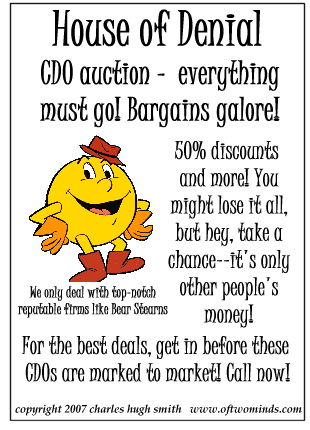 The grim blade of reality, e.g. the market at auction, is threatening to slash valuations
based on lies. You might think a does of reality would be healthy for an economy and a
stock market, but you'd be wrong--the halls of power are ringing with panic at the thought that
the actual market value of this tottering mountain of rapidly depreciating, risk-laden debt will
be revealed.
The grim blade of reality, e.g. the market at auction, is threatening to slash valuations
based on lies. You might think a does of reality would be healthy for an economy and a
stock market, but you'd be wrong--the halls of power are ringing with panic at the thought that
the actual market value of this tottering mountain of rapidly depreciating, risk-laden debt will
be revealed.
Is this fear that the lies will be torn aside defensible on any ground? The answer is resoundingly yes, on the basis of greed. Should the mountain of debt be repriced to reality (marked to market), and re-rated to its actual risk, the mighty dominoes will fall: the bankers who packaged the CDOs, the lenders who originated the mortgages, and a stock market totally dependent on the torrent of cheap, easy money needed to fund private equity buy-outs and corporate buy-backs. Are you proud of a nation whose entire financial structure is terrified of the truth? I am ashamed of this panicked fear of truth, and of the craven greed which powers the desire to maintain the lies at any price and at any cost to the nation. Unfortunately, there is no shame on Wall Street, nor any ethics except "never give a sucker an even break." If you reckon this a rant, then please explain to me how shamelessly stacking lies on lies to keep a rotten, corrupt edifice from falling over of its own weight is "good business," "ethical business," and "good for America." Thank you Vic P. ($1) for your unexpected but welcome donation to this humble site. I am greatly honored by your support and readership. All contributors are listed below in acknowledgement of my gratitude. To view previous entries in June, go to weblog June 2007. (insert brilliant marketing line here which instantly causes erudite readers to) Your readership is greatly appreciated with or without a donation. Heroes and Heroines of New Media Financial contributors who have made multiple donations to this modest site. Thank you for your ongoing support and encouragement.
Our Financial Contributors Thank you all for your gracious and generous support of this modest site.
I would be honored if you link any essay to your website, print a copy for your own use or add my RSS or Atom feed. And of course I appreciate your recommendations of this weblog and your comments: csmith@oftwominds.com. wEssay noun, combination of 'web' and 'essay,' denoting a short online essay which exploits the hyperlinks, interfaces and interactive capabilities of the World Wide Web; coined by Charles Hugh Smith on May 1, 2005, in Berkeley California. Aphorisms I like: "Economic history is a never-ending series of episodes based on falsehoods and lies, not truths. It represents the path to big money. The object is to recognize the trend whose premise is false, ride that trend, and step off before it is discredited." (George Soros) "The way of the Tao is reversal." (Lao Tzu) "Chance favours the prepared mind.” (Louis Pasteur) "It is neither necessary to hope to undertake, nor to succeed to persevere." (French proverb) "You must have a willingness to do something when everyone else is petrified. You must learn the lesson of following logic over emotion." (Warren Buffett) "Success consists of going from failure to failure without loss of enthusiasm." (Winston Churchill) "May a fair road always be open to you." (CHS, April 2, 2006) All content and images copyright © 2006 - 2007 Charles Hugh Smith, All rights reserved in all media, unless otherwise credited or noted. |
 |

This Week's commentaries
July 10, 2007 This Month's Journal Essays Loyalty, Impeachment and 'Supporting the President' by Harun I. 7/10/07 Icons of my youth: Frank Leavis by Protagoras 7/10/07 Equal Killing Rights (satire) by Protagoras 7/03/07 June's Essays Global Warming: Our Story So Far by Michael Goodfellow 6/26/07 The Hockey Stick Breaks (Global Warming Data refuted) by Protagoras 6/26/07 Love in the Time of Syphilis by Protagoras 6/09/07 May's Essays What to do about Health Care? by Michael Goodfellow Memo to the next UK Prime Minister by Protagoras Political Elites & Some Predictions by Michael Goodfellow The Fort Dix Terror Plot by Harun I. The French Presidential Elections by John Kinsella Wal-Mart, disequilibria, and global economic dislocation by Harun I. The Recent UK Elections by Protagoras The Evolution of Social Behaviour by Protagoras Is Everybody Happy? by Michael Goodfellow Memories of Lana'i by Bill Murath
Why I gratefully accept donations and why you might want to donate:
Worth Visiting: ilind.net Mish's Global Economic Trend Analysis Marin Real Estate Bubble West Coast of Canada- Housing/R.E. blog Westside Bubble (L.A.) New York City Housing Bubble Mortgage Lender Implode-o-Meter (Aaron Krowne) California Housing Forecast View from Silicon Valley Credit Flow Investor Market Ticker Rick's Picks Gold Eagle Econotech Great Depression 2006 SocietyDirectory.org Good Web Directory Satellite Sky Policy/Ideas L.A. Visions Darrell Clarke transpo, planning Authors/Artists John Francis Kinsella author/painter Sumpinein (blog) "Letter from Basque Country" Financial Armageddon Michael Panzner The Rhythm of War Terence Parker Bill Murath (chimes & art) buy my novel I-State Lines at The Kaleidoscope (indie bookstore, free shipping) Or from my publisher, The Permanent Press Or from amazon.com: I-State Lines If you want to own gold, I recommend: Buy gold online - quickly, safely and at low prices at BullionVault If you need a quick gift, I recommend: Amazon.com gift certificates Note: at no cost to you, I earn a small commission on purchases made via these two links.
search my site:

blog reactions Amazon.com profile 
Subscribe via RSS: 
What's RSS? add my feed by clicking here: 
To view each entry in its entirety in an RSS reader, please visit my mirror site at oftwominds on blogspot |
||||||||||||||||||||||||||||||||||||||||||||||||||||||||||||||||||||||||||||||||||||||||||||||||||||||||||||||||||||||||||||||||||||||||||||||||||||||
|
Our retail policy: Nothing is for sale except books/films I recommend and my own novel I-State Lines (via links to Amazon.com and The Kaleidoscope: Our Focus Is You independent bookstore) Free alternative: find them at your local library. Though I earn a small commission on Amazon.com books and gift certificates and gold (BullionVault) purchased via links on my site, I receive no fees for any links, advertising or materials on my site. |
home |